
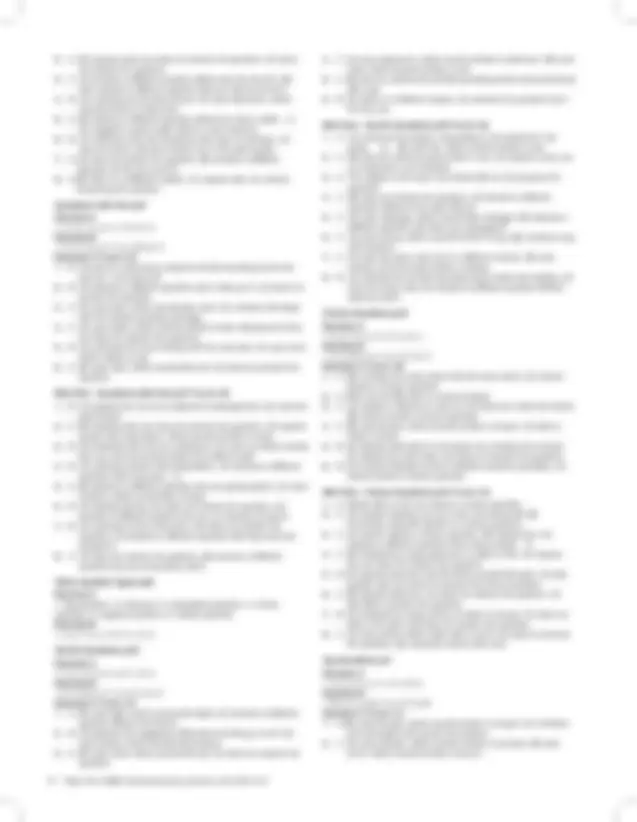
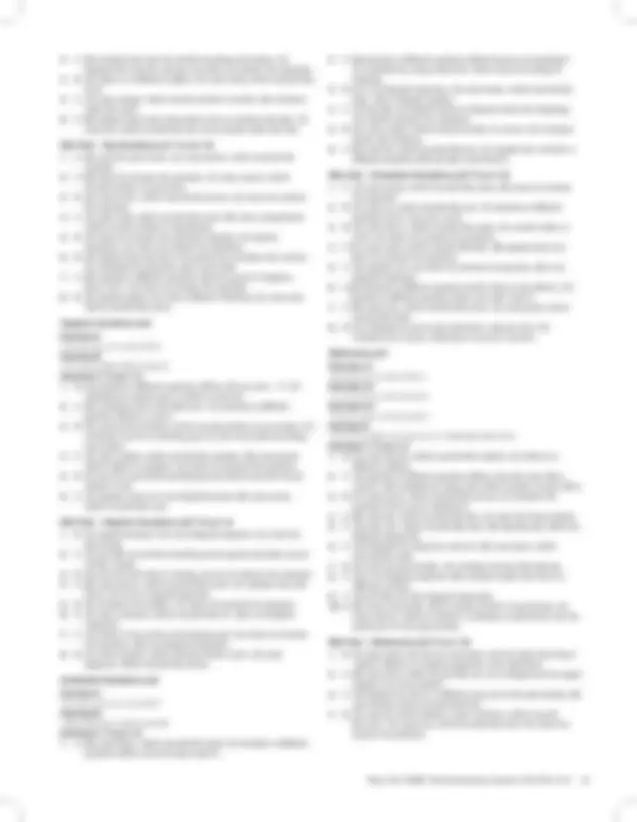
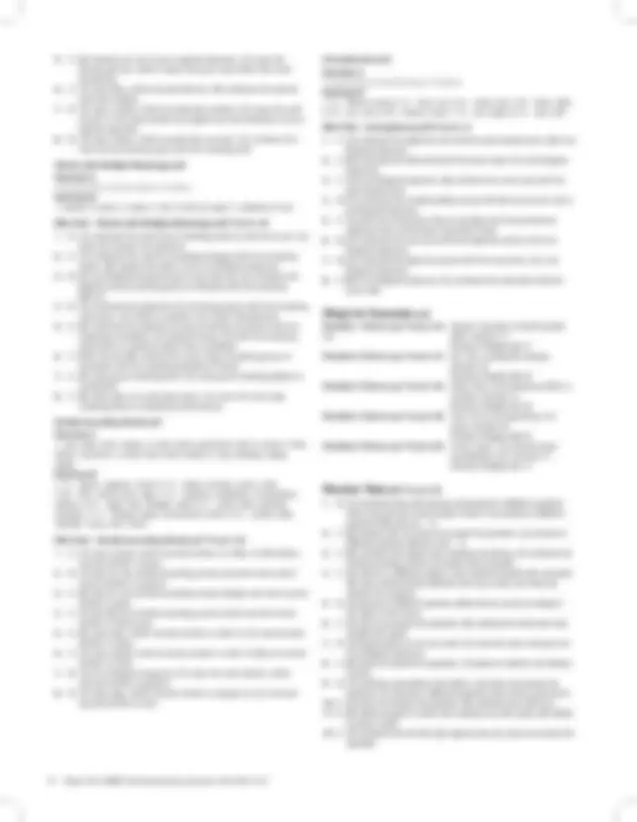
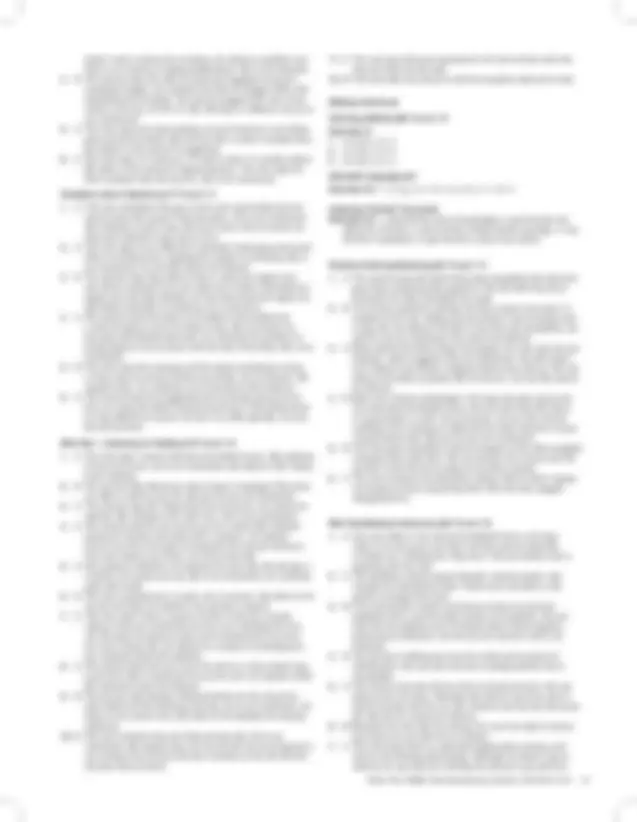
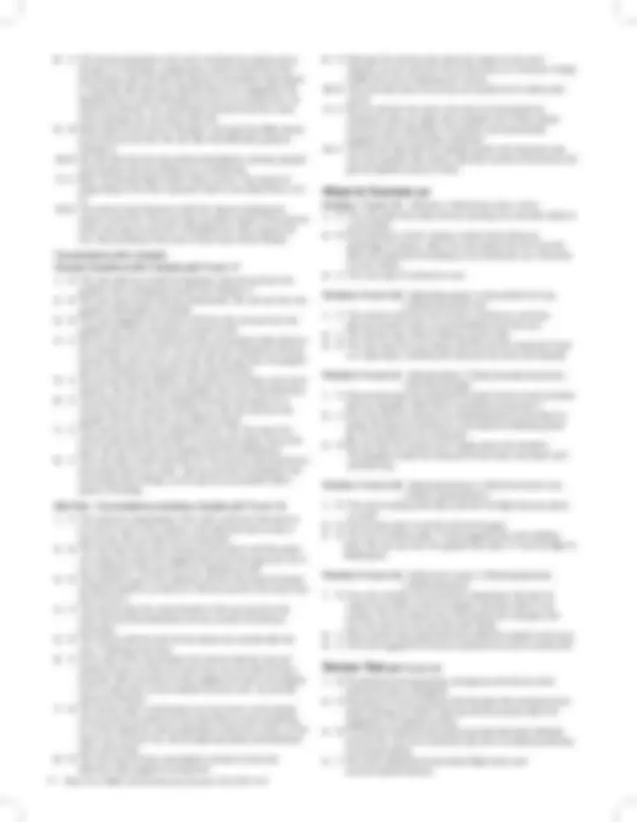
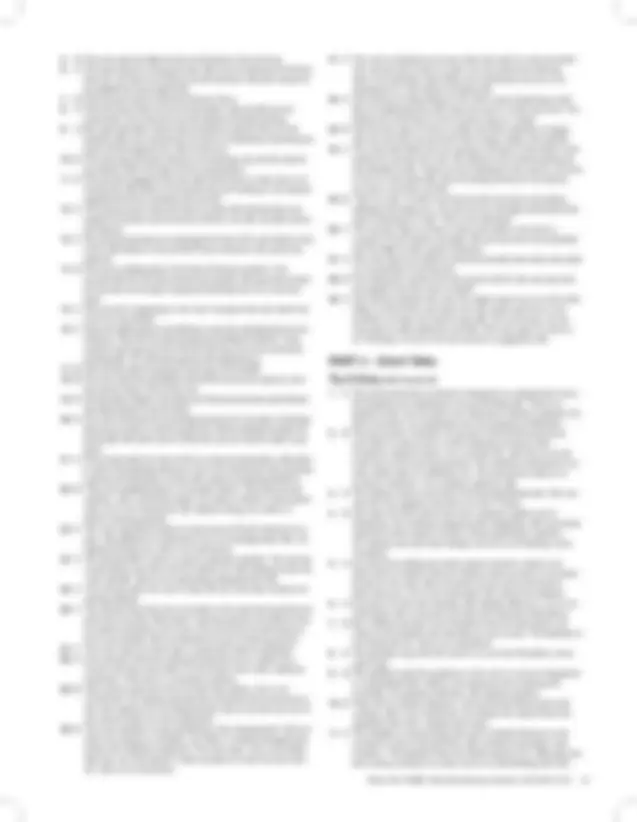
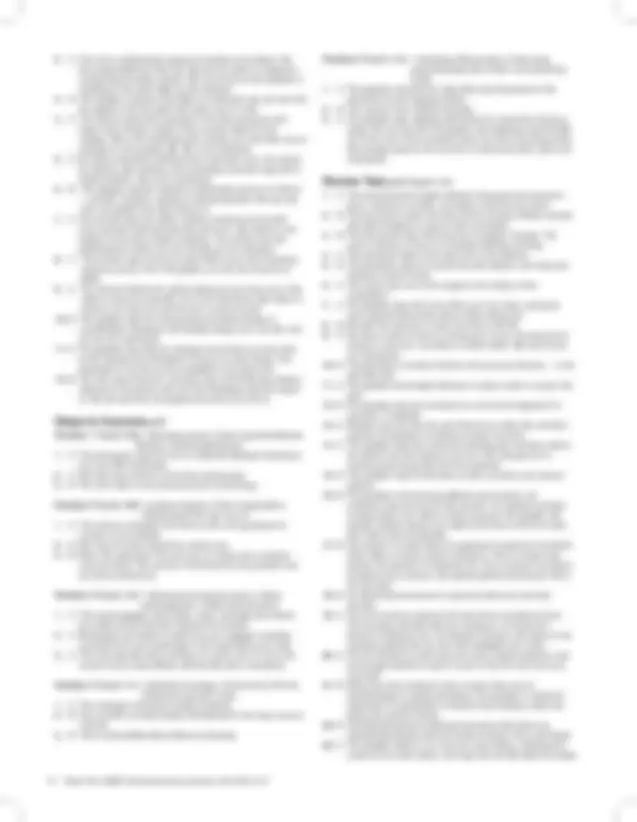
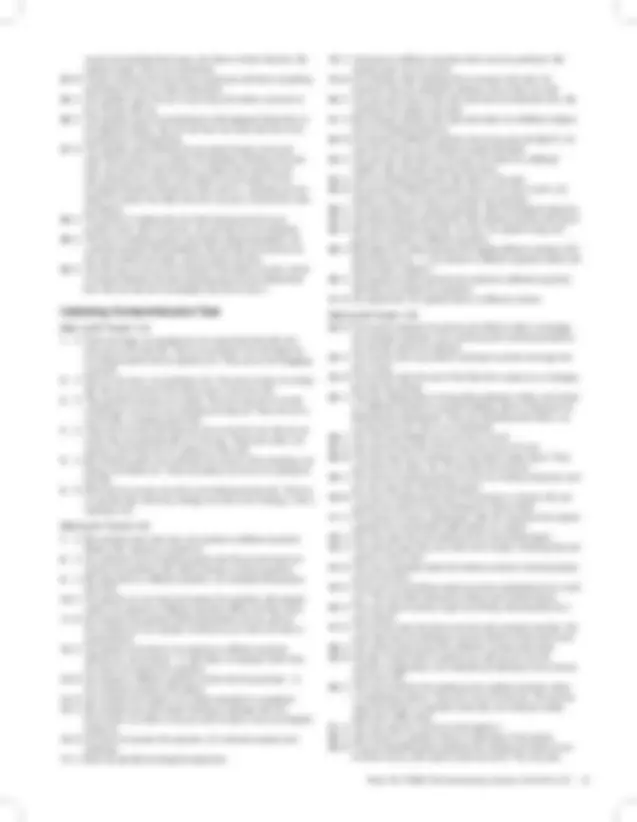
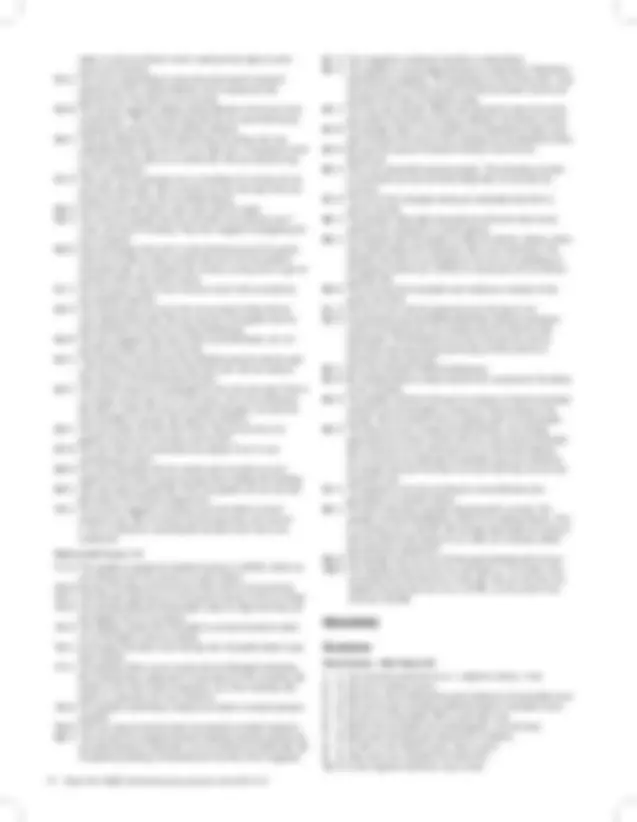
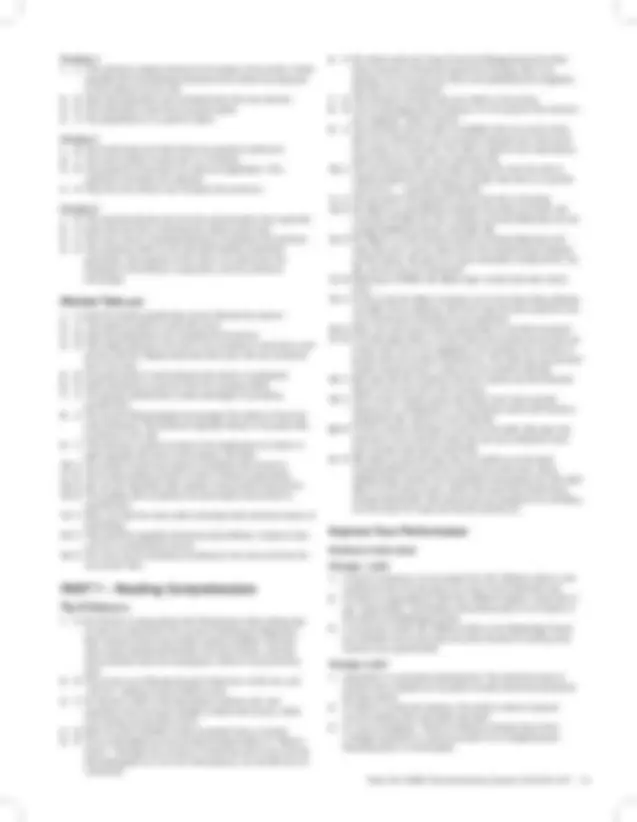
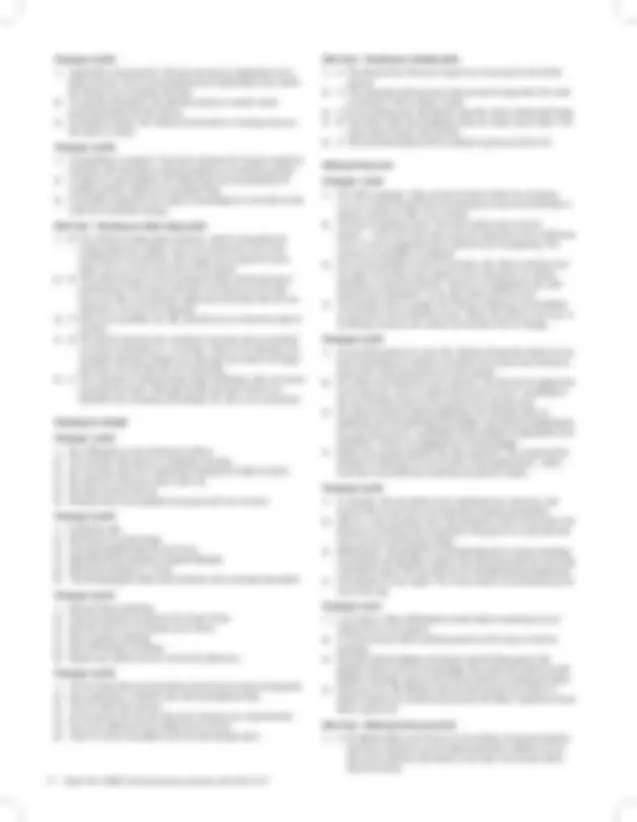
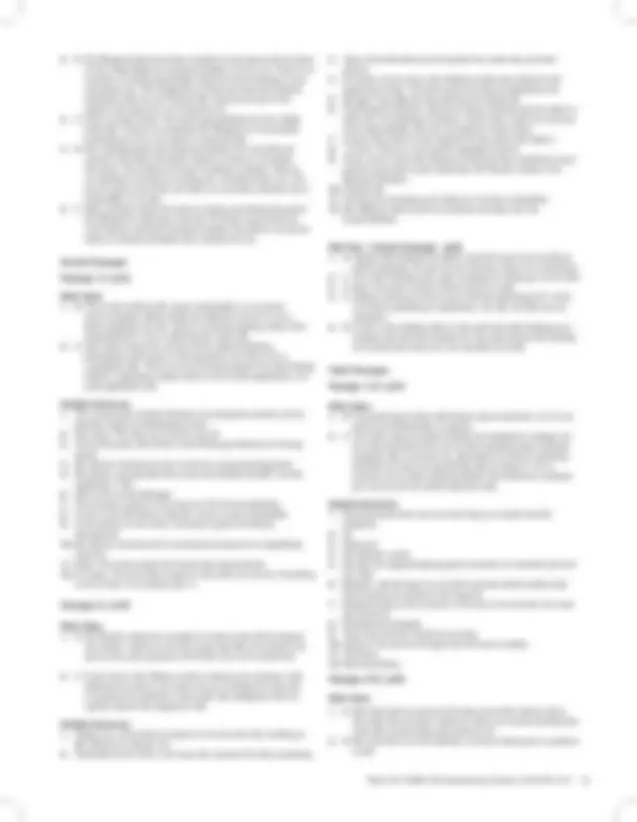
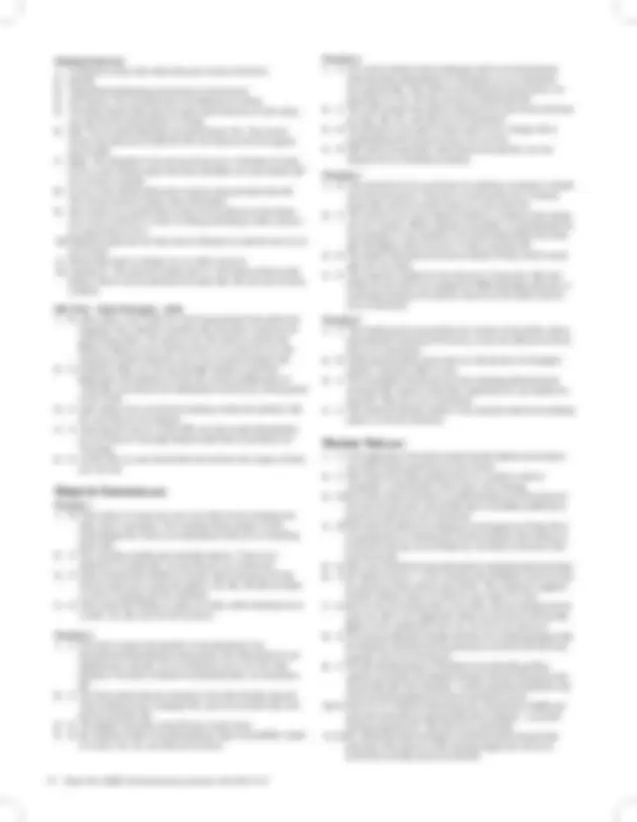
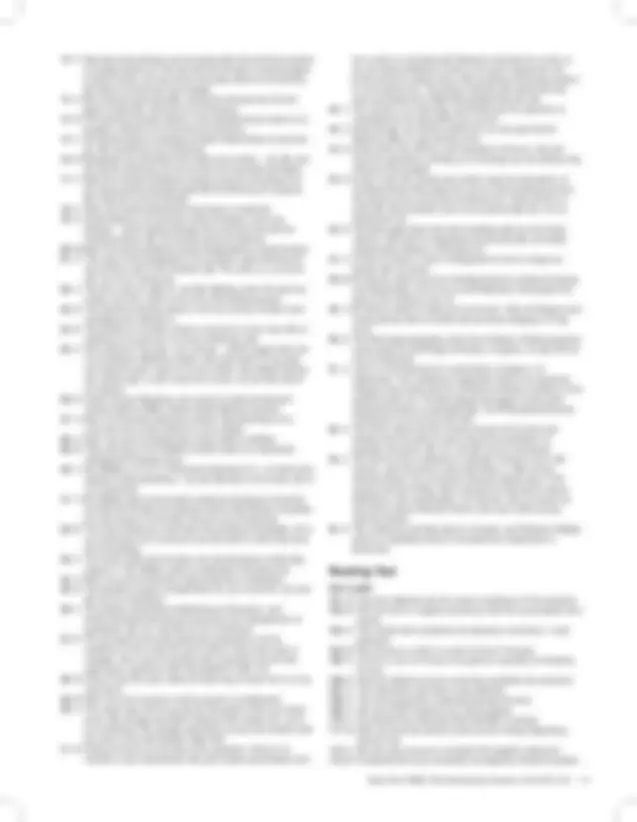
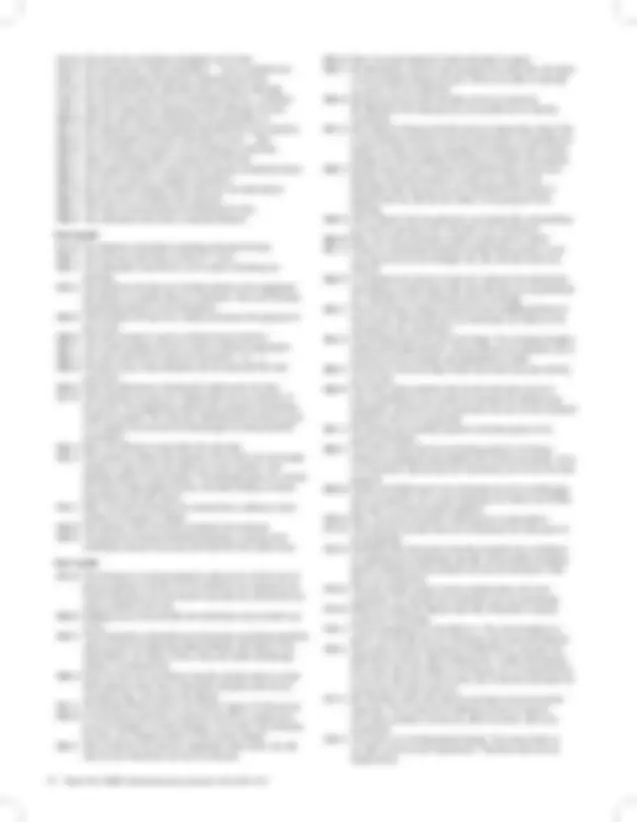
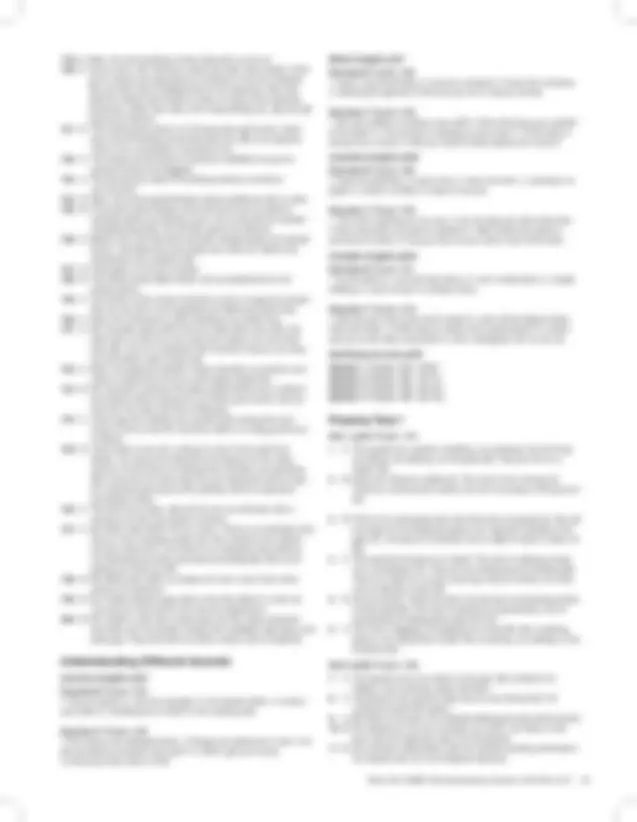
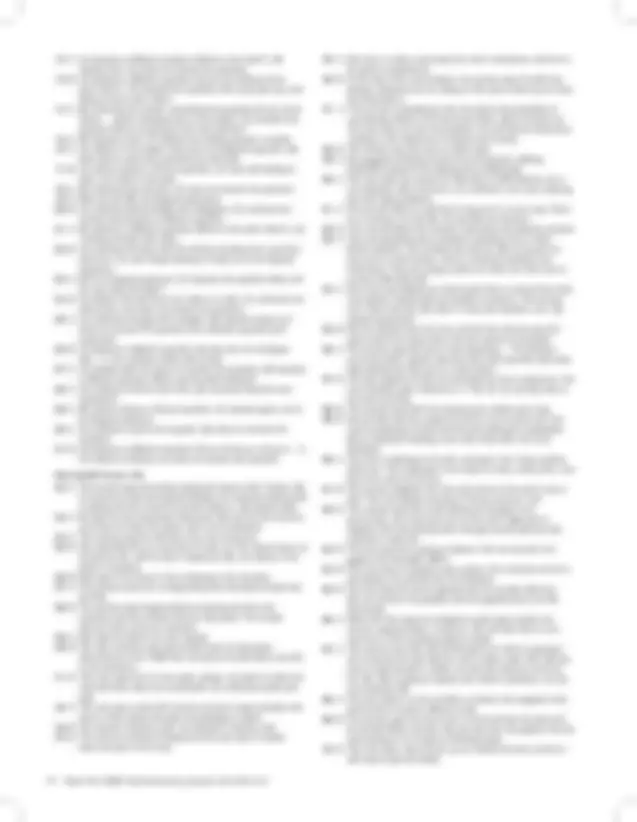
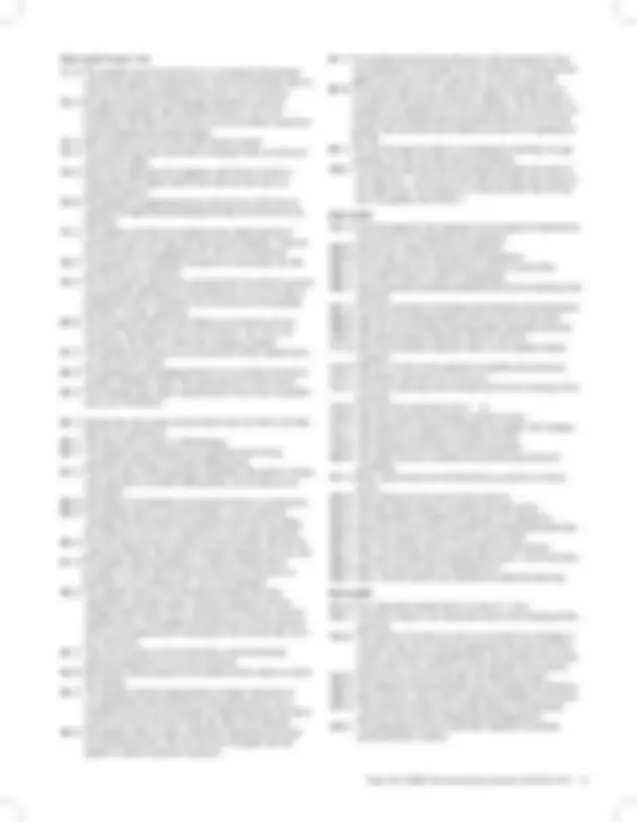

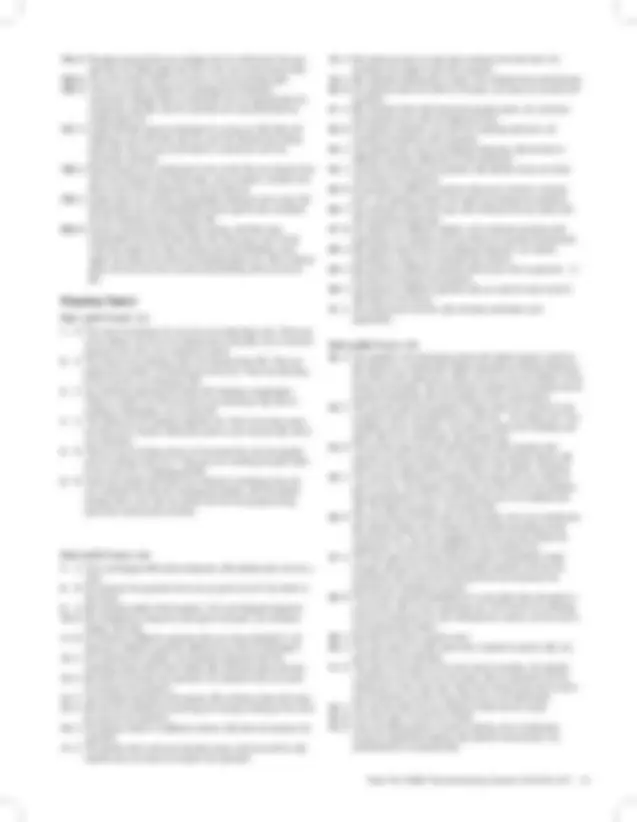
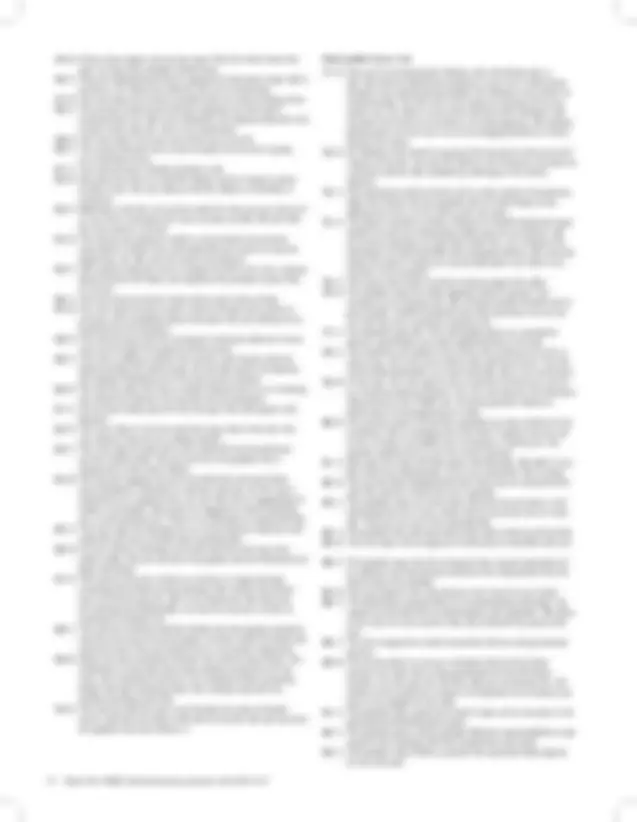
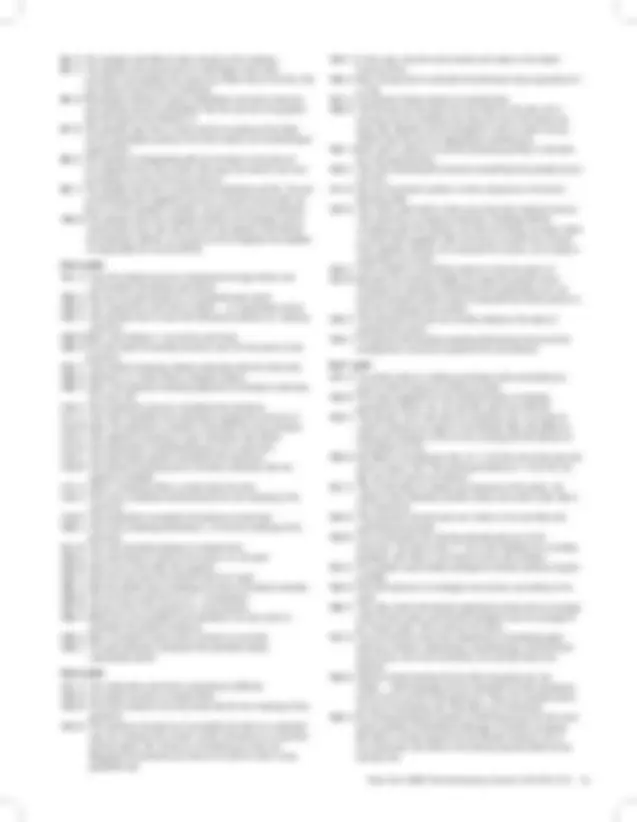
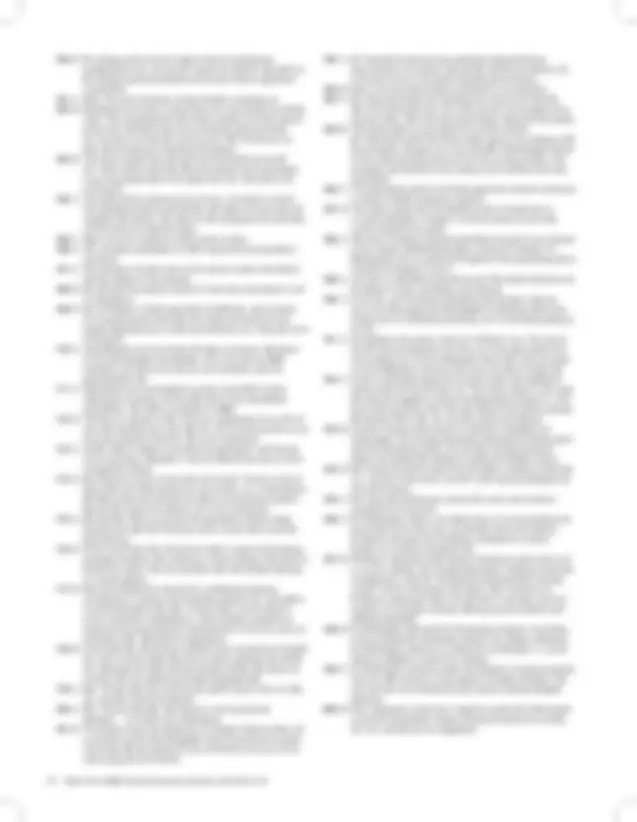


Study with the several resources on Docsity

Earn points by helping other students or get them with a premium plan


Prepare for your exams
Study with the several resources on Docsity

Earn points to download
Earn points by helping other students or get them with a premium plan
Community
Ask the community for help and clear up your study doubts
Discover the best universities in your country according to Docsity users
Free resources
Download our free guides on studying techniques, anxiety management strategies, and thesis advice from Docsity tutors
A collection of english language learning exercises focusing on homophones, main ideas, and listening comprehension. It includes various activities such as mini tests, warm-ups, and double passages. The exercises cover topics like adjectives, verbs, prepositions, and conjunctions, and are designed to improve students' understanding and usage of the english language.
Typology: Exercises
1 / 31

This page cannot be seen from the preview
Don't miss anything!
























1. D In (A), taking sounds similar to talking , but there are no customers in view. She is sitting , not standing , at the reception desk (B). (C) is an assumption. 2. A (B) is confuses the similar-sounding stair and chair. They are not waving at the window (C). The curtains are open (D). 3. D He’s examining a car , not a card (A). He’s fixing the tire , not the car door (B). He is not driving the car (C). 4. B There are no tourists in the lake (A). (C) is incorrect because snake sounds like lake. The trees are not under the water (D). 5. A In (B), trunk sounds similar to truck , but we cannot see the trunk (B). He is sitting , not standing , in the truck (C). He is not getting out of the truck (D). 6. C She is not closing the store (A) or cleaning the window (B). She is looking at the floor not the door (D).
Analyzing Distractors p
Exercise A
1. D Correct. (A) Similar-sounding word ( taking – talking ). (B) Incorrect key word ( sitting not standing ). (C) Incorrect interpretation. Exercise B 2. A Correct. (B) Similar-sounding word ( stair – chair ). (C) Incorrect interpretation. (D) Incorrect key word ( open not closed ). 3. D Correct. (A) Similar-sounding word ( card – car ). (B) Incorrect key word ( tire not car door ). (C) Incorrect interpretation. 4. B Correct. (A) Incorrect interpretation. (C) Similar-sounding word ( snake – lake ). (D) Incorrect key word ( near not under ). 5. A Correct. (B) Similar-sounding word ( trunk – truck ). (C) Incorrect key word ( sitting not standing ). (D) Incorrect interpretation. 6. C Correct. (A) Incorrect interpretation. (B) Incorrect key word ( floor not window ). (D) Similar-sounding word ( door – floor ).
Similar-sounding Words p
Exercise A Track 2
Mini Test – Similar-sounding Words p15 Track 5
1. C She has a black hat , not a cat (A). There are leaves on the ground, but they are not leaving the park (B). They are in the park , not the dark (D). 2. C She’s looking at the drink , not the sink (A). She’s using the coffee machine, not copy machine (B). She’s holding , not folding , a paper cup (D). 3. B The word complaint (A) sounds like paint. The shelves are on the right , not the light (C). The ladder , not the leader , is in the middle (D).
Incorrect Key Words p
Exercise A Track 6
Exercise B Track 7
Mini Test – Incorrect Key Words p17 Track 8
1. C It’s light outside, not dark (A). People are sitting on sofas , not on the floor (B). The blinds , not the windows , are half closed (D). 2. D There’s nobody on the scooter (A). The scooter is parked , not lying , on the road (B). The L-sign is on the front , not the back , of the scooter (C). 3. B She’s using a fax machine , not a computer (A). She’s holding a document , not opening one (C). She’s wearing a short jacket, not a long jacket (D).
Incorrect Interpretations p False Accounts Track 9
1. False. He is not leaning against the wall. 2. True. 3. True. 4. False. There are notices on the board, but he’s not looking at them. 5. False. It is not a vending machine. 6. False. He’s not holding a glass.
Unsupported Assumptions Track 10
Mini Test – Incorrect Interpretations p19 Track 11
1. B There is a music system on the table, but we can’t assume she’s listening to it (A). She not typing at a desk (C). We can’t assume she’s going to sit down (D). 2. D He may need help, but we can’t assume he is asking for help (A). He could be delivering the box so (B) is an assumption. There is a cart, but he is not sitting on it (C). 3. C We can’t assume a match is about to start (A), or that the courts are closed (B). We can see tennis courts, but no signs of construction (D).
Practice 1 C They are indoors, but they are not playing a game (A) or Track 12 sitting in a coffee shop (B). We do not know what they are discussing (D). Practice 2 D Only one woman is wearing glasses (A). We cannot Track 13 assume a purchase is being made (B). There is a clock , not a lock , on the wall (C). Practice 3 A He is in a restaurant, but he is not ordering a meal (B). Track 14 He’s holding a teapot , not his glasses (C). He is pouring , not drinking , tea (D). Practice 4 D We can’t assume this is a competition (A). The man is Track 15 hitting , not hiding , a tennis ball (B). Nobody is picking up the balls (C). Practice 5 B She is not washing her hair (A). The poster is on the wall , Track 16 not on the mirror (D). They are not watching television (C).
1. C He is not filling the car with gas (A). He is loading the trunk , not the truck (B). (D) is an assumption. 2. A The food is on a table , not on the floor (B). Nobody is sitting on the sofa (C). There is a teapot , not a saucepan , on the table (D). 3. B He standing on a ladder , not a chair (A). There is nobody sitting outside (C). The chairs are facing away from the poster (D). 4. D She’s sitting behind the counter, not on it (A). (B) is an assumption. There is a picture on the wall (C), but she is not looking at it. 5. C The bus has already arrived (A). The weather is sunny, with no rain (B). They are boarding a bus , not a train (D). 6. B The pillows are on the bed , not the floor (A). The picture is on the wall next to the bed, not above it (C). Nobody is sleeping in the bed (D).
1. B (A) repeats morning , but does not answer the question. (C) is a response to a suggestion. 2. C (A) uses the same verb finish , but in the past simple. (B) repeats work , but as a verb and without answering the question. 3. C (A) answers a different question ( What color is…? ) and confuses blue with new. (B) repeats printer , but does not answer the question. 4. B (A) confuses get back ( return ) with back ( part of the body ). (C) answers a different question ( Why are you coming back…? ). 5. B (A) repeats like and confuses the similar-sounding words down and town. (C) answers a different question ( Why don’t you want to sit down? ). 6. A (B) responds to a different statement ( Is this your ticket? ). (C) repeats return , but in a different context. 7. C (A) uses soon to mislead recently. (B) refers to a different subject ( He ). 8. A (B) repeats visit. (C) answers a different question ( Would you like to visit…? ). 9. C (A) confuses the similar-sounding words called and cold. (B) uses the same context, but does not answer the question. 10. B (A) confuses the similar-sounding words computer and producer. (C) answers a different question ( Whose is that…? ). 11. C (A) confuses hat with that , and (B) confuses suitcase with shoelace. 12. B (A) confuses the similar-sounding words feeling and healing. (C) does not answer the question. 13. C Neither (A) not (B) answers the question. 14. C (A) uses the same verb, but a different subject. (B) confuses meeting with seating.
Wh- Questions p
Exercise A
Questions with What p
Exercise A
Mini Test – Questions with What p34 Track 20
1. C (A) answers a different question ( Would you like to…? ). (B) confuses by repeating time. 2. A (B) confuses gift with present from presentation. (C) answers a different question ( Did the clients like…? ). 3. B (A) confuses the noun watch with watching. (C) confuses tree with TV. 4. C (A) uses seat, which sounds similar to eat. (B) confuses meet (which sounds like meat ) with eat. 5. A (B) uses plane, which sounds similar to plan. (B) confuses to pay with today. 6. B (A) repeats car , but answers a different question ( Is that your car? ). (C) confuses far with car. 7. C (A) confuses the similar-sounding words coast and cost. (B) confuses the similar-sounding words lost and cost. 8. B (A) confuses the similar-sounding words drink and think. (C) repeats think but does not answer the question.
Questions with When or Where p Exercise A
Mini Test – Questions with When or Where p35 Track 22
1. B (A) answers a different question ( Can I get a taxi? ). (C) confuses tax with taxi. 2. C (A) uses art, which sounds similar to start. (B) confuses moving with movie. 3. A (B) answers a different question ( When was this machine made? ). (C) confuses paid with made. 4. A (B) confuses take orders with place an order. (C) confuses place with replace. 5. B (A) uses heights, which sounds similar to night. (C) does not answer the question. 6. C (A) does not answer the question. (B) confuses find it with founded. 7. A (B) uses looking, which sounds similar to booking. (C) confuses the noun book with booking (meaning reservation ). 8. B ( A) confuses the similar-sounding words way and stay. (C) answers a different question ( How long will we be at…? ).
Questions with Who , Whose , Why , or Which p Exercise A
Mini Test – Questions with Who , Whose , Why , or Which p Track 24
1. B (A) uses walk, which sounds similar to work. (C) answers a different question ( Do you work in…? ).
3. A (B) confuses fair with the similar-sounding word fares. (C) repeats train and the verb go , but does not answer the question. 4. B (A) refers to a different subject. (C) uses clerk, which sounds like work. 5. C (A) uses merger, which sounds similar to worker. (B) confuses walk with work. 6. A (B) repeats boss and uses arrived now to confuse with late. (C) uses sell, which sounds like tell , and confuses later with late.
Mini Test – Tag Questions p41 Track 32
1. A (B) uses the past tense. (C) uses station, which sounds like vacation. 2. A (B) does not answer the question. (C) uses unsure, which sounds similar to brochures. 3. B (A) uses home, which sounds like phone. (C) does not answer the question. 4. C (A) uses walk, which sounds like work. (B) uses compartment, which sounds similar to department. 5. B (A) does not answer the question logically. (C) repeats anywhere , but does not answer the question. 6. B (A) repeats they and job in the plural, but confuses the context. (C) misleads by using the same word offer. 7. A (B) answers a different question ( Kenny’s gone to England, hasn’t he? ). (C) does not answer the question. 8. B (A) repeats paper , but with a different meaning. (C) uses note, which sounds like wrote.
Negative Questions p
Exercise A
Mini Test – Negative Questions p42 Track 34
1. B (A) repeats forward , but is an illogical response. (C) uses the past tense. 2. C (A) and (B) use similar-sounding words ( great and plate sound similar to late ). 3. B (A) and (C) both refer to driving, but do not answer the question. 4. A (B) uses phone, which sounds like home. (C) repeats Lisa and home , but is not a logical response. 5. B (A) confuses the subject. (C) does not answer the question. 6. C (A) uses overdone, which sounds like fun. (B) is an illogical response. 7. C (A) refers to the context and repeats year , but does not answer the question. (B) is an illogical response. 8. B (A) uses enjoyed, which sounds similar to join. (C) uses beginner, which sounds like dinner.
Embedded Questions p
Exercise A
Mini Test – Embedded Questions p43 Track 36
1. C (A) uses shoes, which sounds like news. (B) does not answer the question. 2. B (A) uses up, which sounds like cup. (C) answers a different question ( Can I use your cup? ). 3. B (A) uses Paul’s, which sounds like walls. (C) colorful refers to color , but does not answer the question. 4. C (A) uses came, which sounds like train. (B) repeats train , but does not answer the question. 5. C (A) repeats use , but does not answer the question. (B) is an illogical response. 6. A (B) answers a different question ( Is Mr. Chen in his office? ). (C) answers a different question ( How old is Mr. Chen? ). 7. A (B) uses nice, which sounds like price. (C) uses guest, which sounds like best. 8. B (A) misleads as are no job vacancies, only job cuts. (C) confuses the context, referring to cuts as in injuries.
Statements p Exercise A 1.e, 2. b, 3. f, 4. a, 5. d, 6. c Exercise A
Mini Test – Statements p45 Track 38
1. B ( A) says where the lecture took place, and (C) says how long it lasted. Neither is a logical response to the statement. 2. A (B) uses drink, which sounds like ink. (C) is illogical as the paper supply is not the problem. 3. C (A) repeats the time in a different way, but in the past simple. (B) uses thirsty, which sounds like thirty. 4. B (A) uses sit, which relates to seat , and floor, which sounds like door. (C) uses four, which sounds like door , but does not answer the question.
5. A (B) repeats car , but is not a logical response. (C) uses the phrase get lost, which means lose your way rather than lose something. 6. C (A) uses ship, which sounds like trip. (B) confuses the adverb well with healthy. 7. B (A) uses contact, which sounds like contract. (C) uses the verb cancel , in the past simple, but begins Yes and therefore is not a logical response. 8. B (A) uses collect, which sounds like connect. (C) confuses the verb hold (meaning carry ) with the meaning wait.
Words with Multiple Meanings p
Exercise A 1.a, 2. b, 3. b, 4. b, 5. a, 6. a, 7. a, 8. a Exercise B
Mini Test – Words with Multiple Meanings p46 Track 39
1. B (A) confuses the verb book (meaning reserve ) with the noun. (C) does not answer the question. 2. C (A) confuses the verb fix (meaning arrange ) with the meaning repair. (B) repeats fire alarm , but is an illogical response. 3. B (A) is an illogical response due to the verb use. (C) confuses the adjective hard (meaning solid or inflexible ) with the meaning difficult. 4. B (A) confuses the adjective hot (meaning spicy ) with the meaning very warm. (C) refers to weather, not indoor temperature. 5. A (B) confuses the adjective wrong (meaning incorrect ) with the meaning unsuitable. (C) repeats wrong , but with the meaning dishonest or unethical rather than unsuitable. 6. C Both (A) and (B) confuse the noun class (meaning group of students ) with the meaning standard of travel. 7. A (B) uses good meaning kind. (C) uses good meaning skilled or competent. 8. A (B) uses play as a verb play music. (C) uses the noun play meaning show or theatrical performance.
Similar-sounding Words p
Exercise A
Mini Test – Similar-sounding Words p47 Track 40
1. C (A) uses copies, which sounds similar to coffee. In (B) believe sounds similar to leave. 2. B (A) and (C) use similar-sounding words ( checked and collect sound similar to project ). 3. A (B) and (C) use similar-sounding words ( design and mine sound similar to sign ). 4. C (A) and (B) use similar-sounding words ( hotel and sell sound similar to Personnel ). 5. A (B) uses take, which sounds similar to cake. In (C) read sounds similar to ready. 6. C (A) uses depart, which sounds similar to chart. In (B) art sounds similar to chart. 7. B (A) is an illogical response. (C) uses the verb decide, which sounds similar to applied. 8. B (A) uses play, which sounds similar to (re)pay. In (C) unknown sounds similar to loan.
Homophones p Exercise A
Practice 1 Warm-up Track 42 : Would, Tuesday is fine/I’d prefer the 28th, Answer: C Practice Track 43: C Practice 2 Warm-up Track 44 : Do, Yes, usually/Not always, Answer: B Practice Track 45: B Practice 3 Warm-up Track 46 : What, He’s a businessman/He’s a student, Answer: A Practice Track 47: B Practice 4 Warm-up Track 48 : Can, I’ll try my best/Sorry, I’m busy, Answer: B Practice Track 49: B Practice 5 Warm-up Track 50 : I don’t want, You should leave now/Neither do I, Answer: C Practice Track 51: A
1. B (A) confuses living with leaving , and answers a different question ( How long have you been living in Paris? ). (C) answers a different question ( Why are you…? ). 2. A (B) repeats milk , but does not answer the question. (C) answers a different question ( Where is the…? ). 3. A (B) confuses the subject and meaning of working. (C) confuses the similar-sounding words commuters and computer. 4. C (A) refers to a different subject, and confuses handle with canceled. (B) uses ordered which related to the noun order , but does not answer the question. 5. B (A) answers a different question ( What did you study at college? ). (C) refers to the future. 6. C (A) does not answer the question. (B) confuses So with snow and tonight with might. 7. B (A) repeats take out , but as a verb. (C) uses the same verb get , but is an illogical response. 8. A (B) does not answer the question. (C) gives an opinion, but without context. 9. B (A) confuses cancellation with station , and does not answer the question. (C) answers a different question ( How did you get here? ). 10. C (A) does not answer the question. (B) confuses how with now. 11. A (B) relates bought to credit , and confuses car with cards. (B) relates to play to cards. 12. C (A) confuses hat with that. (B) repeats idea , but does not answer the question.
6. A The man complains of a toothache. The woman asks to take a look and says she needs to do something about this urgently. We can infer she is a dentist. (B), (C), and (D) cannot therefore be inferred.
Mini Test – Listening for Main Ideas p69 Track 63
1. B The woman asks about adult education classes. The word courses also indicates a college. 2. B The woman asks about business courses. She is not looking for a job (A) or a vacation (C). The phrase twice a week for ten weeks refers to the class schedule, not a work schedule (D). 3. C The man is giving information about the Business Administration course. He is not studying (A) or on vacation (B). (D) is a distractor, as the word business appears twice. 4. A The woman mentions that this soup is cold and the bread is hard. There is food (B) and the man apologizes (C). The soup is cold, not the room (D). 5. C Only a waiter, not a friend (A), would apologize for the cold soup. A cook (B) would be in the kitchen not waiting tables in the restaurant. (D) is not mentioned. 6. D The man promises to change the soup and bring more bread. (A), (B), and (C) are not mentioned. 7. B The woman says the annual conference in Paris is next week. She is not going there on vacation (A). (C) cannot be inferred and (D) is not mentioned. 8. A The man says the hotels…will be full by now and the woman replies I’ve tried everywhere. She mentions taking a train, but not that a train is late (B). The hotels may be expensive (C), but that is not the problem. (D) cannot be inferred. 9. C The woman says she will book a hotel further out (of the city). (A) is incorrect, (B) cannot be inferred, and (D) is not mentioned. 10. C The man mentions Lisa’s birthday and suggests a party to celebrate. (A) is not mentioned. (B) distracts by suggesting food. They are making preparations, but not for a meeting (D). 11. D The man says he will get some sandwiches delivered. The room they choose is easy to clean , but we cannot infer the man will clean it (A). The man will call to order food, not call home (B). The woman will order the drinks , but it is not mentioned that the man will have a drink (C). 12. D They say the party will take place in Meeting Room 4 , and that people can stop by before they leave the office. We can infer they work together.
Listening for Details
Questions about Time p72 Track 66
1. C The man says we should be able to finish it next week. The woman says See you on Monday (A) but this is a distraction. (B) is a distractor for have a good weekend. (D) relates to how long the project has lasted so far. 2. D The woman says You only bought it two weeks ago. (A) is not mentioned. (B) repeats over the weekend. (C) is incorrect. 3. D The woman says the lecture starts at three and lasts for two hours. (A) confuses the time with the length of the lecture. (B) is the start time. (C) is the time the man thinks the lecture finishes. 4. A The woman says It’s only Tuesday and later promises I’ll do it right away. (B) is not mentioned. (C) is the day of the meeting. (D) is a distractor for weekend. 5. C The man says he goes on Mondays and Fridays. (A) repeats every day in the woman’s question. The man mentions three times a week (B) but doesn’t go that often. (D) is incorrect. 6. D The man advises the woman to do it right away when you get in tomorrow. (A) repeats right away but in the context of tomorrow. (B) is the current time. (C) is not mentioned.
Questions about Reasons p73 Track 67
1. C The man says A lot of documents seem to be missing. (A) is a distractor for the old system (i.e. the previous system). (B) is not mentioned. (D) refers to computer and confuses the context. 2. B The man agrees it is convenient to be able to walk to work. (A) is incorrect, as his new home is smaller. (C) relates to train and walk but confuses the context. (D) relates to his previous home. 3. D The man says their coworker James is away at a convention. (A) repeats main office but confuses the context. (B) confuses manage with manager. (C) repeats convention but refers to the woman. 4. D The woman says I have to wait for a client to call. (A) is not mentioned. (B) confuses the Jenkins account with accounts. (C) repeats invoice but confuses the context. 5. C The man says Mr. Fraser resigned , and a new Research Director is needed. (A) confuses resigned and declined. (B) repeats new but confuses the context. (D) refers to the length of time Mr. Fraser was in his job. 6. A The man says he has a really bad stomachache. (B) repeats wait , but this refers to the man’s annual review. (C) confuses doctor and daughter. (D) repeats annual review but it isn’t the reason he can’t come in.
Questions about Plans p74 Track 68
1. C They decide to play tennis and go for a long walk. (A) confuses tennis and test. (B) is incorrect as the man says they finished that report. (D) repeats country but confuses the context. 2. D The woman plans to apply for a permanent position and is in Toronto. Vancouver (A) is mentioned, but she says I’ve changed my mind. (B) repeats contract but confuses the context. They talk about her job (C) but she didn’t quit it – it ended. 3. C The man asks Is a credit card OK? (A) confuses the verb check with the noun check. (B) repeats cash but he doesn’t have enough. (D) is not mentioned. 4. A The woman mentions a blue dress and then later says the blue is a little more suitable. (B) and (C) are mentioned but are incorrect. (D) confuses suitable and suit. 5. A The woman accepts a job offer. (B) is incorrect as she will give a month’s notice. She will be working, not on vacation (C). She has found a job, and is not looking for one (D). 6. B The man mentions plans to close our Munich branch. There is already a branch in London (A). (C) repeats investors but confuses the context. The company will employ some people in New York, not lay off employees there (D).
Questions about Offers and Requests p75 Track 69
1. A The man says he will get a sandwich and says I can get one for you too. He is going to buy food, not do the woman’s shopping (B). The woman asks the man to buy her a drink (C). She will give him some money, rather the man lend her some (D). 2. C The man asks Would you mind staying late tonight... (A) repeats five o’clock. (B) repeats Monday but confuses the context. (D) relates to the woman’s plans for the evening. 3. B The woman says I can give you my monitor. (A) and (D) are not mentioned. (C) repeats desk but confuses the context. 4. A The man asks Would you like some tea or coffee? (B) is not mentioned, but late and wait sound like ate. The man offers to call Mrs. Aiten on her cell phone, not give it to the woman (C). (D) confuses check as a verb with check as a noun. 5. B The man mentions a chair and asks Do you mind if I take this one? (A) is not mentioned. (C) repeats friends. (D) relates to any minute and confuses the context. 6. C The woman asks for ten percent off all future orders. (A) repeats boss. (C) confuses competitive with competition. (D) is not mentioned.
Questions about Suggestions and Advice p76 Track 70
1. B The woman suggests the man look at job sites on the web. The man has already tried employment agencies (A) and newspapers (C). (D) is not mentioned. 2. D The woman suggests the man find a good taxi company to collect Mr. Chan. (A) repeats Mr. Chan. (B) repeats schedule. (C) is not mentioned. 3. B The man advises the woman to contact Media Relations and ask them about a vacancy there. (A) is incorrect as the woman
doesn’t want to leave the company. (C) relates to qualified , but there is no mention of taking qualifications. (D) is not indicated.
4. D The woman says the office is small and suggests moving to someplace bigger. (A) confuses the idea of a bigger office with expanding the company. The woman suggests the man move closer to the city, not live in it (B). Moving to a different city (C) is not mentioned. 5. A The man says How about eating out and mentions a new Italian place across the street. (B) and (C) refer to what is usually done. (D) relates to the woman’s suggestion. 6. A The man says I’d I were you , I’d catch a train to a nearby station. (B) refers to the woman’s original intention. The man says the train is quicker than the bus (C). (D) is not mentioned.
Questions about Opinions p77 Track 71
1. C The man complains The guy on the violin was terrible and the woman says she couldn’t hear the piano. (A) is not mentioned. (B) confuses couldn’t hear with loud music. (D) is incorrect as they were relieved it was only an hour. 2. A The man says It’s so difficult to remember what goes where and refers to all these bins , implying the system is confusing. (B) is not mentioned. (C) and (D) cannot be inferred. 3. D The woman says they will be lucky to reach the targets and she will be surprised if we can reach any of them. She feels the targets are very high already, not that they should be higher (A). (B) relates surprised to surprising. (C) is incorrect. 4. A The woman says the shop is not marked in the leaflet and it took her ages to work out where it was. (B) is incorrect as the shop was finished last week. (C) confuses the problem of finding space in the museum with the size of the shop. (D) is not mentioned. 5. D The man says the company will fail unless something is done, or they may not survive another six months. (A) is incorrect. (B) repeats lucky. (C) confuses a lot of decisions with divisions. 6. A The woman says the suggested price is twenty percent more than our rivals and asks if anyone would buy it. She thinks there is a big difference in price, not that it is a little high (B). (C) and (D) are incorrect.
Mini Test – Listening for Details p78 Track 72
1. A The man says I need to talk about his latest invoice. (B) confuses invoice and voice. (C) is not mentioned. (D) relates to Mr. Yang’s lunch meeting. 2. D The woman asks Would you like to leave a message? She does not offer to call the man (A). (B) and (C) are not mentioned. 3. C The woman says Mr. Yang should be out by two. (A) cannot be inferred. (B) confuses soon with noon. (D) is not mentioned. 4. A The woman asks Do you want to go for a meal? (B) confuses leaving for Houston and pack with a vacation. (C) repeats French , but this is the type of restaurant the woman mentions. The man needs to go home , not move home (D). 5. C He is going to Houston on business the next day. He will sign a contract, not rewrite one (A). (B) is not mentioned. (C) confuses pack with snack. 6. D The man is going home to pack. (A) is incorrect. (B) refers to his trip the next day. (C) relates to the woman’s request. 7. C The man says I have a couple of shirts I’d like you to wash. Various times are mentioned, but he is not checking the time (A). He wants someone to pick up his laundry from his room, not room service (B). (C) relates to a couple of (meaning two ), but confuses shirts with desserts. 8. A The woman asks the man to put the shirts in a blue plastic bag. A pink form (B) is mentioned, but by the man. (C) repeats closet. (D) confuses closet and deposit. 9. B The woman says laundry collected before six P.M. should be back before ten the following morning. (A) is not mentioned. (C) refers to the current time. (D) refers to the deadline for laundry collection. 10. D The man mentions they are thirty minutes late. (A) is not mentioned. (B) repeats map , but the woman has not forgotten it. (C) confuses the context and also confuses on the left with left , the past tense of leave. 11. C The man says We were supposed to be here at three and that they are thirty minutes late. 12. B The man asks the woman to tell the reception desk we’re here.
Making Inferences
Inferring attitude p80 Track 74 Exercise A 1 A. b, B. a, C. a 2 A. b, B. a, C. b 3 A. b, B. a, C. a Idiomatic language p Exercise A2: 1. e, 2. g, 3. f, 4. b, 5. a, 6. h, 7. c, 8. d
Listening “behind” the words Exercise A3: 1. help him/her carry the package, 2. give him/her the afternoon off work, 3. give him/her a black printer cartridge, 4. buy him/her a sandwich, 5. give him/her a ride to the station
Practice Inferring Meaning p82 Track 75
1. A The woman says she spent three days negotiating the deal and gave them everything they asked for. We can infer that she is frustrated the client cancelled the order. 2. B The woman questions whether the bill is correct and says I’m amazed at the cost , adding that she doesn’t have enough cash to pay. We can deduce the bill is more than she anticipated. (A) and (C) are not mentioned. (D) cannot be inferred. 3. A When asked if the Blue Kings are popular, the man says Are you kidding? , which suggests they are well-known. He also adds I can’t believe I got tickets , implying tickets soon sell out. We can deduce the band is popular. (B) is incorrect. (C) and (D) cannot be inferred. 4. D Both men mention advantages. One says the pay’s good and the other likes the flexible hours. We can infer they both feel it is a good place to work. (A) is incorrect, as one man started working at the company in 2004 and the other started a couple of years before that. (B) and (C) are not mentioned. 5. B The man gives examples of price increases at the office supplies company they order from. We can tell from the context and the woman’s tone that she is angry at the hike in prices. 6. C The man mentions the alternative charity Pets At Home , saying he thought we were supporting them. His tone also suggest disappointment.
Mini Test Making Inferences p83 Track 76
1. A The man refers to the customer feedback forms, and says They’re not very good, are they? and the woman responds I’m afraid not , meaning No, they aren’t. We can deduce she is agreeing with the man. 2. C The speakers mention signal strength, network speed , and charges for international calls. These terms all relate to cell phone coverage and costs. 3. B The conversation centers around low scores in customer feedback forms, and the high number of complaints. We can infer that the speakers are concerned about these negative performance indicators. (A) and (C) are incorrect. (D) is not indicated. 4. D The woman is offering the man her credit card as proof of identification. We can infer that she is asking whether this is acceptable. 5. A The woman says she left her driver’s license at home. We can deduce she can drive. Although she doesn’t have her card or driver’s license with her, we can’t deduce she has lost her purse (D). (B) and (C) cannot be inferred. 6. B Because the man tells the woman You won’t be able to borrow any books we can infer this is a library. 7. C The man says there is a jazz band playing that evening, and that he was thinking about going. Although he doesn’t say so directly, we can infer he is inviting the woman to go with him.
5. B The man says her flight arrives at five thirty in the morning. 6. A The man says it’s a very good rate. (B) is not mentioned. It has four stars (C), but this is not why he recommends it. We don’t know if it is available for three nights (D). 7. B They are part of the Customer Service Team. 8. A The man says There is a lot of information. (B) and (D) are not mentioned. (C) is incorrect as the website is finally working. 9. A She says she didn’t know there would be a photo of her on the website. (B) is not mentioned. (C) aims to mislead by including the name of their department. (D) is incorrect. 10. D The man says his boss came to our wedding. (A) and (C) cannot be inferred. (B) is the topic of the conversation. 11. D The woman suggests the man asks his boss for a raise. (A) is not mentioned. (B) refers to the house they are looking at. (C) repeats neighborhood but confuses the context. 12. C The woman says I wish we lived in a place like that and the man replies the house must be worth a fortune. (A), (B), and (D) cannot be inferred. 13. C The woman passes on a message from the C.E.O. (A) refers to the C.E.O. (B) relates to the job title Finance Director. (D) cannot be inferred. 14. B The man is calling about the Finance Director position. The woman tells him he has not been successful. We can infer he had an interview as he says It was good meeting the C.E.O. and the team. 15. C The woman is agreeing to the man’s request that she thank the C.E.O on his behalf. 16. C They are talking about translating a customer feedback form into Chinese. They are not discussing any feedback itself (A). They mention that a group from China is arriving , but not an overseas booking (B). (C) confuses appear with appearance. 17. B The woman says the group is arriving on the twelfth. 18. B The man says the translation should be done by an agency , and the woman says I’ll try to find one. 19. D The phrases weighs , send them to Paris and priority mail indicate this takes place in a post office. 20. D The man mentions he is sending books as It’s my sister’s birthday. He does not plan to visit his sister (A). He has already bought the books (B). His sister lives in Paris (C), but he doesn’t plan to go there. 21. A The woman asks the man to fill in a customs declaration. (B) refers to when the package will arrive. (C) is not mentioned. (D) confuses customs (meaning tax or duty ) with custom (meaning tradition ). 22. B They are speaking about a coworker, Kevin. They discuss his present, card, and future plans. (A) refers to Kevin’s travel plans only. (C) is not mentioned. (D) repeats hiking , but refers to Kevin’s leaving present. 23. A The man says Kevin plans to travel around South America for a year. His girlfriend is mentioned, but no marriage plans (B). (C) repeats another job. (D) is not mentioned. 24 C The phrase Well I never is used to express surprise. The woman knows Kevin and has met him before (A). She believes what the man said (B). She is not expressing disagreement (D). 25. C The woman asks the man to stop the car , and then reviews his driving abilities. 26. A The woman says the man is not safe on the road and mentions he almost hit a cyclist. She doesn’t say he practices a lot (B) but that he needs to practice a lot more. (C) is incorrect as she says you don’t concentrate. (D) is a distractor for your reversing is poor. 27. C The man says he never saw a cyclist and seems surprised. 28. A One woman mentions eating sandwiches at our desks for a month until they were able to come down here when cafeteria reopened. They are in a company canteen. 29. B One woman says the food is worse than before. (A) is not mentioned. (C) repeats sandwiches and links this incorrectly to the man saying I’m a bit disappointed. (D) is incorrect as one of the women says it’s more expensive. 30. B The man decides to say something to the management. We can infer he is going to complain. (A) refers to eating arrangements before the cafeteria reopened. The man says I can cook better than this , but this doesn’t mean he plans to cook his own food (C). (D) is not mentioned. 31. C The man is asking the woman what she wants to eat and drink. The woman has a train to catch, but (A) cannot be inferred. (B) is not indicated. Soft drinks are mentioned, but he is not employed in a soft drinks company (D). 32. A The woman is responding to the man’s query Anything to eat? She is explaining why she does not want to order any food. The inference is she has no time to have soup or salad. 33. D The woman says I’ll have a coffee and then decides on large. We can see from the price list that a large coffee costs $2.50. 34. C The man asks When are you going to be back in the office? and hands the woman her coat. (A) relates to the hotel booking he has already made. There is a taxi waiting for the woman, but she is not at a taxi stand (B). She is leaving shortly for the airport, but she is not there yet (D). 35. B “You’re a star” is said to someone who has done something willingly that helps you. (A) and (C) are wrongly associated with other meanings of “star.” (D) is not indicated. 36. C The woman says It’s three o’clock and adds I only have a couple of hours before my flight. We can see from the schedule that the flight at 5pm goes to Darwin. 37. A The man says he ordered a Vermont sweater last week and adds I’m wondering if it arrived yet. 38. B The reference number the man gives is 5219. We can see from the graphic that the color is Green. 39. A The woman advises the man You might want to try it on first. She offers to refund the cost back onto his credit card if he is not satisfied, so does not need to pay (B). (C) is incorrect, as the man gave a valid reference number. The man says I’ll come in on Thursday , so this is not the woman’s suggestion (D).
1. A The announcement is aimed at shoppers in a department store. All shoppers are addressed, not just families (B). There is a fashion event, but the talk is not directed at fashion students (C). (D) is incorrect, as employees are not shopping at Martlet’s. 2. B The announcer mentions 10 percent off all shoes and boots, and refers to discounts on other selected products. She mentions a fashion show , not a contest (A), and this is not the main focus of the announcement. The clothing mentioned is on sale, rather than on exhibition (C). The announcer refers to a summer collection , not a charity collection (D). 3. D The fashion show is at 2:30 in the Fountain Restaurant. We can see from the graphic that this is on the 4th^ Floor. 4. D Lee says his call is about the new computer system we’re designing. (A) confuses resigning with designing. (B) incorrectly assumes online search function means planning a website. (C) repeats new and uses design , but he is not starting a new company. 5. A Lee says that adding an online search function means a lot more work is needed. We can deduce that he wants to increase his fee for the work. (B) is incorrect as the extra work hasn’t been done yet. (C) is not mentioned. (D) cannot be inferred. 6. A Lee says I’m free next Tuesday. (B) repeats afternoon. (C) is not mentioned. (D) is incorrect as there are financial implications. 7. B Mrs. Gifford has been Vice President here for three years. (A) refers to the position she will take up next month. The speaker is the Chairman (C). (D) is not mentioned. 8. D The speaker says she first came to us as Vice President, three years ago. 9. B The speaker asks the audience to join me in a round of applause to congratulate Mrs. Gifford. (A) assumes she is leaving the company. (C) repeats Chairman. (D) repeats position. 10. D They are in a Space Museum. (A) incorrectly links books with a library. (B) is not mentioned. (C) relates the varied items the speakers lists with a department store. 11. A The speaker is announcing that work is finally finished on the museum’s brand new gift shop. (B) confuses renovation with donation. The speaker does not thank anyone (C). Although she lists various products on sale, she is not advertising them (D).
12. C The speaker says Shortly, the renovation of the cafeteria will also be completed. (A) confuses renovation with vacation. (B) relates to the speaker’s wish for strong sales. (D) repeats financial , but there is no suggestion of difficulties ahead.
Listening for Main Ideas
Questions about the Speaker p107 Track 89
1. C The phrases Welcome aboard , flight AE564 , flying , an altitude of , land , and flight all indicate this is in an airplane. 2. C The speaker is welcoming the audience to the Seaview Bay Resort. The phrases check in at reception and Welcome Guest Pack suggest this is a hotel. The speaker says I’m in charge here. 3. D The speaker mentions Joe’s Grill , steak , and dish , and refers to Everyone who works with me in the kitchen.
Questions about the Topic p107 Track 90
1. B The speaker mentions the man’s experience and knowledge , and invites him to attend the final stage of interviews. She is talking about a job vacancy. 2. A The speaker mentions Washing your hands as it prevents the spread of disease. She reminds the audience to clean the tables , food trays , and the area around the beds. 3. C The ad mentions 50 percent off everything and great end-of- the-season bargains for listeners who come to the store this weekend.
Questions about the Audience p108 Track 91
1. B The speaker mentions the next stop and says they will visit the Statue of Liberty , which is the last destination in our tour today. 2. B The speaker refers to a half price promotion in the fruit and vegetable section. The audience are not working on a farm (A), selling food (C), or eating in a restaurant (D). 3. C The message gives a number for callers to dial for emergency dental advice.
Questions about the Location p108 Track 92
1. D The speaker mentions the Impressionist rooms , and says there are over sixty paintings , mentioning Monet and Renoir. 2. C The speaker says this train will arrive on Platform 2. 3. B The key words mentioned are reports , grade , end-of-semester exam , study and students.
Questions about the Purpose p109 Track 93
1. A The speaker says it is important to exercise regularly , and mentions the benefits of a daily walk. He also mentions cycling, golf and tennis. Serious health problems (B) are mentioned, and team sports (C), but neither is the main reason for the talk. The speaker says more exercise results in a longer life (D), but this is a result of exercise, not the purpose of the announcement. 2. C The speaker says he wants to express his gratitude for the staff’s hard work over the last year. They work at a conference venue (A), and have won an award, but he is not accepting it now (B). (D) is not mentioned. 3. B The woman is paying tribute to Dr. Williams, who is retiring after 37 years at the research facility. No new employees are mentioned (A). They work in a research facility, but she is not opening one (C). (D) confuses hard work with the need to work harder.
Mini Test – Listening for Main Ideas p110 Track 94
1. B The ad tries to attract customers with free offers and big discounts. (A) and (C) are not mentioned. The checks will result in safer cars (D), but this is not the main purpose of the ad. 2. D The ad promises free engine and winter tire checks. No products are mentioned (A), only services. (B) confuses a warranty for work done on a car with vehicle insurance. Prices for services are reduced, but no cars are on sale (C). 3. C The ad is directed at all listeners; loyal customers and people who are new to Mike’s Motors. 4. B The report mentions a national strike will take place following the breakdown in contract negotiations between a farm workers union and management. 5. C The speaker is the host of a feature called Jobs Bulletin on WNRC Radio. She is a news presenter. 6. A The report is being made from the radio station. A union is mentioned but they are not outside the headquarters (B). The speaker mentions a press conference (C), but that was three hours ago. (D) refers to the union leader. 7. A The woman is preparing the audience for a talk by local historian Peter Fletcher. 8. C The speaker is mostly talking about Richard Warren , a settler who arrived in 1620. The topic is local history, but she is not speaking about its importance (A). She only introduces historian Peter Fletcher, rather than talks about him (B). The Mayflower is mentioned (D), but is not the topic. 9. B The talk is held at the Cape Cod Historical Society , and is for the general public. 10. D The woman is introducing Mr. Sanchez , who she says is the latest member of our team. 11. D The woman says Mr. Sanchez will work with everyone in the Sales and Marketing Department. (A), (B), and (C) cannot be inferred. 12. B The woman mentions main course and dessert , so this would indicate they are in a restaurant.
Listening for Details
Questions about Numbers, Dates, and Times p113 Track 97 A
1. C The payments were paid every month for the last six months. 2. C The speaker says the case will probably go to trial next month. 3. A Parker Buildings is the company mentioned. No other building companies are thought to be involved. B 1. B The speaker says the cafeteria will close for approximately one month. 2. A Employees are told to use the Coffee Shop on the third floor. We can see from the graphic that they should press button 2 to get to the third floor. 3. D Employees will each receive $50 in coupons per week. Questions about Reasons and Requests p114 Track 98 A 1. B The speaker says the delay is because of road repairs. 2. B Passengers are advised to go to Bay 3 and wait there. 3. D The next bus at Bay 3 is the 15:45 service to London , not Newcastle. B 1. B The ad promises ultrafast broadband at the cheapest rates. 2. B To qualify for the $50 credit, customers will need the Advance Net Plus 24-month contract. From the graphic we can see this costs $20 per month. 3. A New customers can get a free two-gigabyte memory stick , but only until the end of the month.
Questions about People and Places p115 Track 99 A
1. A The speaker says he will move to Sun City, Arizona. 2. C His first job was as an Assistant Manager. He was then Section Director (A). He is now Vice President (D). (B) Is not mentioned. 3. A The speaker says he will be handing over responsibilities to Mr. Hammond. B 1. D Only graduate students can borrow up to ten books at a time. 2. B The speaker says The red zone is the silent area and No talking in the red zone. 3. B Books can be left in the book drop at the West entrance if the library is closed. We can see from the graphic that this is Location 2.
2. A The man is addressing a group of travelers at an airport. He has responsibility for their trip. (B) and (C) relate to engineers conducting the safety checks. (D) is incorrect as the speaker is traveling on the same flight as the listeners. 3. D The speaker mentions their flight is to Mumbai. We can see from the graphic that they gate they need to go to is 63. 4. C The woman welcomes everyone to the open sessions and hopes they will give a taste of the courses offered at the college. She is not advertising the courses (A), and there are no changes to the program (B). (D) is not indicated. 5. C Mr. Ivanov has been suffering from a stomach virus. (A) cannot be inferred. (B) confuses virus (meaning computer bug ) with a health problem. (D) is not mentioned. 6. B The speaker says Dr. Gardner’s philosophy lecture is in Room 1, and Ms. Cooper’s session is directly opposite. We can see from the graphic that this is Room 2. 7. A The woman says the coffee machine would be for the staff room and later adds the teachers will love it. (B) relates to the subject of the call (a drinks machine). The woman saw the advertisement online, but (C) and (D) are not indicated. 8. C The woman says I know you said £300 is your limit (meaning maximum price ). From the graphic, we can see the price is $350. 9. A The woman finishes the call by saying Let me know soon. She offers to send an email (B). (C) is not mentioned. She refers to reviews , but does not ask the man to write one (D). 10. D The speaker says the restructuring will shake things up considerably (meaning it will change things a lot). (A), (B), and (C) are not mentioned. 11. A The speaker says that the changes should free up some time for Mr. Sanders (the President) to focus on other things. The implication is he has no time available to do these now. 12. B The man says they don’t yet know who will fill that key position , referring to the person who the Vice Presidents will now report to. We can see from the graphic that this is the C.E.O.
Practice 1 Track 108 1 What/announced, 2 How long/Vicks/Mundo Medical, 3 What/implied/news
1. C The announcer says the C.E.O. of Mundo Medical is leaving to join rival PRC Chemicals. 2. C She has been there for more than twenty years. 3. B The man refers to the announcement as shocking.
Practice 2 Track 109 1 problem/website, 2 How long/problem, 3 What/mean/This can’t go on.
1. C The woman complains that there is still a wrong telephone number on the website. 2. D She says It’s been almost four weeks now. 3. B Here, the expression This can’t go on means that a solution must be found. The woman is frustrated that the problem has not been resolved yet.
Practice 3 Track 110 1 Where/announcement/made, 2 What/ passengers/do, 3 When/arrive/London
1. C The words luggage , seat , aisles , racks , and bags are related, but buffet service and train indicate the location. 2. A Passengers are asked to make sure your luggage is labeled correctly and to put small bags in the racks above your seat. 3. C The man says We will be arriving in London at 9:15. (A) is the current time in Great Britain. (B) and (D) aren’t mentioned.
Practice 4 Track 111 1 What/aim/message, 2 kind/movie/7:00 P.M., 3 Where/movie/rock music
1. C The message is all about tonight’s features. 2. B The romantic comedy Always a Bridesmaid is the only movie at 7:00 P.M. 3. D This is where Metal Music Mania is showing.
Practice 5 Track 112 1 How/Argo 250/compare, 2 How long/ guarantee/Argo 250, 3 How much/save/buy today
1. A The speaker mentions the Argo 250 uses 50 percent of the electricity of other leading brands. 2. D The vacuum has a lifetime warranty. 3. A The speaker says shipping will be free for customers who buy today. We can see from the graphic that shipping costs $19.99. (C) is the cost of the accessory pack, but this is not discounted. (D) wrongly assumes the vacuum is reduced by 50%. (B) is not mentioned.
1. C The announcement begins Attention Shoppers and mentions store , checkout counters , purchases , and food and drink. 2. B The announcer warns the store will be closing in fifteen minutes and asks shoppers to pay for their purchases. 3. B The announcer says that tomorrow is bargain Tuesday. The store is shortly to close. It is therefore Monday evening. 4. C The presenter refers to the fans here in the stadium. 5. D The presenter says he is joined by both players , who have just finished a tennis match. 6. A The match was one of the longest in the history of this competition. 7. A The speaker says this is the office you’ll be using , and gives some general information about where things are. 8. B He says the restroom is down the hall on the left. 9. C He says a client of mine is coming soon so we can assume he will go to meet him. (A) refers to coffee maker. (B) and (C) are not mentioned. 10. D Thunder Bay in northern Ontario will see some showers… in the late afternoon. 11. A The speaker encourages listeners to enjoy a walk or a jog in the park. 12. B The speaker says by mid-week we could hit 20 degrees! It is currently 17 degrees. 13. A Phrases such as Over the next three hours , After that , and then indicate the speaker is outlining a series of events. 14. C The speaker says that everyone attending the seminars shares the desire to be the best you can be in life. He goes on to mention personal growth and true potential. 15. D The speaker says he will wrap up with a question and answer session. 16. B The speaker is announcing different news stories. (A) confuses news announcer with reporter. (C) repeats business correspondent , but refers to Kate Leung not the speaker. (D) repeats climate change , but reflects the focus of the first news item rather than the speaker. 17. B This extract is mostly about an agreement reached at the World Trade Talks to r educe carbon emissions. This is a major step forward. No speech is mentioned (A). (C) is incorrect as carbon emissions are to reduce. (D) repeats global warming but this is not the topic. 18. B An official announcement is expected within the next sixty minutes. 19. A The ad is aimed at anyone who has had an accident at work. The company will deal with your employer , so the ad isn’t aimed at employers (A). (C) repeats insurance. (D) refers to the company placing the ad, who will investigate your claim. 20. A The ad mentions a cash lump sum and a regular payment , and encourages listeners to get in touch to find out how much you could get. 21. B When you have nothing to lose it means there are no disadvantages to doing something. The speaker is using this expression to emphasize to listeners that making a claim can bring only positive results. 22. B The radio presenter is outlining the sections of the show, as indicated by phrases such as In a few moments , Then , and Finally. 23. C The speaker refers to our very own Laura Sharp , implying she works for the radio station, and says she will talk about the latest
music and entertainment news. (A) refers to Hamir Sharma. (B) repeats singer. (D) is not mentioned.
24. B To give someone the full picture means you tell them everything necessary for them to fully understand. 25. A The speaker says The sun is just rising and adds Local time is five minutes after six. 26. C The speaker says the temperature is 68 degrees Fahrenheit , or 20 degrees Celsius. We can see from the chart that this is the temperature in Hong Kong. 27. D The speaker asks listeners for any spare foreign coins and says these will go to a charity. The speaker mentions the local time, but does not ask listeners to adjust their watches (A). (B) confuses the context, and relates to the location of the envelopes listeners should put their coins in. Listeners are not asked to contact the cabin crew (C), but just to hand them their envelopes. 28. A The person is making this lost child announcement at an outdoor event. (B) is incorrect. (C) and (D) are not indicated. 29. C The boy is wearing a green and yellow striped sweatshirt. (A) confuses sweater with sweatshirt. (B) and (D) are incorrect as his cap is black and white, and his pants are blue. 30. A The lost boy is now at the Customer Information Counter , which is located between the face-painting area and the refreshment tent. We can see from the graphic that this is Area 1.
Part 1 p137 Track 114
1. A There are bags, but people are not unpacking them (B) and they are not for sale (D). This is at an airport, but the bags are not being loaded onto an airplane (C). They are on the baggage carousel. 2. C He is in the room, not entering it (A). The room is tidy, not messy (B). We do not know if the bed is next to the door (D). 3. C This question focuses on a detail. The man may be at a hotel checking in, but he is not checking his bag (A). They are not in a store (B), or shaking hands (D). 4. C They are not boots and they are not on the floor (A). We do not know they are samples (B) or in the way. These are racks, not shelves , and there are no clothes on them (D). 5. A (B) mentions water , but confuses the context. He is washing , not drying , the dishes (C). There are plates, but he is not waiting for any (D). 6. D She may be a nurse, but she is not helping anyone (A). There is no elevator (B). She has a badge, but she is not holding it, she’s wearing it (C).
Part 2 p141 Track 115
7. A (B) confuses hear with here. (C) answers a different question ( What is Mr. Jameson’s position? ). 8. C (A) confuses room (meaning space ) with Room and does not answer the question. (B) cannot answer a choice question. 9. A (B) responds to a different problem. (C) misleads linking there with here. 10. C (A) repeats out , but does not answer the question. (B) repeats called , but answers a different question ( When did they call? ). 11. B (A) answers the question What presentation did you give at the conference? (C) repeats conference , but does not refer to presentations. 12. C (A) repeats recommend , but answers a different question ( Would you recommend…? ). (B) refers to staying in New York, but does not answer the question. 13. B (A) answers a different question ( Is the train the quickest…? ). (C) confuses vacation with station. 14. B (A) confuses the subject. (C) relates assistance to assistant. 15. A (B) confuses the verb break meaning to damage with the noun break. (C) refers to Do you want to take a , but is an illogical response. 16. B (A) does not answer the question. (C) confuses replace and briefcase. 17. C Both (A) and (B) are illogical responses. 18. C (A) answer a different question ( How much is parking? ). (B) repeats park , but as a noun. 19. B (A) confuses male (relating this to women ) with mail. (C) assumes they are waiting for delivery of an order, not mail. 20. C (A) uses past tense of the verb work and the distractor fine. (B) confuses the subject and topic. 21. A (B) confuses amazed with raise and refers to a different subject. (C) is an illogical response. 22. B (A) answers a different question ( How long was the flight? ). (C) uses the verb fly , and confuses tonight and flight. 23. C (A) uses the verb leave in the past, but refers to a different subject. (B) confuses relieved with leave. 24. C (A) is an illogical response. (B) refers to the past. 25. B (A) answers a different question ( How much did it cost? ). (C) relates to days , but does not answer the question. 26. C (A) cannot answer a choice question. (B) is an illogical response. 27. C (A) relates leaving with finished. (B) confuses imports with report. 28. A (B) uses the phrase feel like , not feel. (C) repeats today and good but answers a different question. 29. A (B) begins No , which answers the slightly different question Did Naomi say which…?. (C) answers a different question ( When did Naomi leave college? ). 30. C (A) repeats money and back but answers a different question. (B) does not answer the question. 31. B (A) repeats tell. (C) repeats help in a different context.
Part 3 p142 Track 116
32. B The woman answers the phone and offers to take a message. (A) confuses extension , line , and busy with technical problems. (C) and (D) cannot be inferred. 33. A The woman tries Lucy Ward’s extension number and says the line is busy. 34. B The woman asks the man if he’d like her to pass on a message. He says Yes please. 35. A They are talking about moving filing cabinets, tables, and chairs to a different location in another building. (B) is a distractor for Maintenance Department. They are relocating their office, not moving home (C). (D) is not mentioned. 36. C The man says Maybe we could hire a truck? 37. A The woman says she will find out how much it’ll cost. 38. B The man says he is working on this week’s sales report. They are both in an office. (A), (C) and (D) are incorrect. 39. A The woman mentions going to lunch at a nearby restaurant, and the man says OK, that sounds good. 40. B The man is working and says I’ll be along in a minute. We can assume he wants to keep working for a short while. 41. C The words on board , passengers , take off , Customs and captain indicate this conversation takes place on a plane. 42. A The man says they are waiting for two more passengers. 43. C The woman says they can’t wait much longer , meaning they will wait for a short time. 44. D The man complains about the desks covered in dust and paper all over the floor. 45. D To be sick of something means you have experienced too much of it. The man feels annoyed at Andy’s poor performance. 46. A The man says he wants to get rid of Andy, and advertise for a new cleaner. 47. D The woman says they have won five big contracts recently. The man says they are starting to see the results of their hard work. 48. A The woman says we got the Jefferson contract last week. 49. D He says I’ll give them a small bonus. (B) and (C) are the woman’s suggestions. (A) misleads by referring to the contract they have won. 50. C The man mentions the meeting room upstairs and later refers to impressing visitors. They can’t be in a hotel (A). The woman says she will go to a garden center (B). (A) confuses coffee table with coffee shop. 51. A The man says we could put more lights in. 52. C She will go to a garden center on Saturday to buy plants. 53. B They are speaking about painting the ceilings and walls on the first floor rooms, and need to know the color. The man also
Auxiliary Verbs – Mini Test p
1. B Only cannot ( can’t ) is possible to express present inability. 2. D We use have to as this is something that is necessary. 3. A Could completes this polite request. 4. D We use should have to express advice in the past. 5. C Here we use didn’t have to (meaning it was not necessary ). 6. B To express negative possibility in the past we use could not have. 7. D Here might expresses possibility. 8. B To indicate present ability, we use can. 9. A Occasionally, must is used to express present obligation. 10. B Here, could completes the negative possibility.
Comparatives and Superlatives – Mini Test p
1. B The superlative of the three-syllable adjective serious is needed here. 2. B The comparative using as…as completes this sentence. 3. A The comparative more interested is used before than. 4. C This option gives the complete comparative form of the three- syllable adjective expensive. 5. A Only more modern can be followed by than. 6. C To complete this comparative sentence, as…as is used. 7. D Although separated, the comparative form here is worse than. 8. A The superlative the least difficult is needed here. 9. B After just (meaning equally ) the structure as…as must be used. 10. D The comparative form of this one-syllable adjective is nearer.
Subject–Verb Agreement – Mini Test p
1. A The subject is singular, so has completes this present perfect tense. 2. B Because the definite article is used, only is can complete the present continuous tense. 3. D Despite the plural managers , one of takes a singular verb. 4. C The object is plural ( sports ), but the subject is program , which is singular. 5. C Money takes a singular verb form, so was completes the past simple passive. 6. D The indefinite article is used here, so are completes the present continuous tense. 7. C The subject is Singapore , which takes the singular verb form. 8. B Time takes a singular verb form, so is completes the present simple tense. 9. B Nobody is a singular subject. 10. A Although the name of the restaurant uses the plural Chefs , it takes a singular verb.
Pronouns – Mini Test p
1. D Only the reflexive pronoun correctly completes this sentence. 2. C The possessive pronoun is needed here. 3. A In this case we use the possessive adjective. 4. A Mr. Lee is the subject, so we need the subject pronoun. 5. C The possessive adjective is needed to complete this sentence. 6. A The subject is We , so we need the object pronoun. 7. B The object pronoun is needed here. 8. D The possessive adjective completes this sentence. 9. C In this case we use the reflexive pronoun. 10. B The possessive pronoun is needed here.
Verb Forms and Tenses – Mini Test p
1. B For actions in progress in the past we use the past continuous. 2. D Here we need the present continuous for a planned future event. 3. A The action finished in the past, so the past simple is used. 4. C The present perfect is used for this unfinished action. 5. B For plans made earlier, we use to be followed by going to. 6. C The past continuous is used for actions in progress in the past. 7. A The action is completed in the past, so we use the past simple. 8. C The present simple is needed to complete this sentence. 9. C With since , the present perfect is normally used. However, this refers to the completed past, so the past perfect is used. 10. D We use the present continuous for things happening around now.
Gerunds and Infinitives – Mini Test p
1. C After forbid the infinitive with to is used. 2. A After mind we use the gerund. 3. C The gerund is needed here as the action ( wasting money ) started before. 4. B This is the subject of the sentence, so we need the gerund. 5. D After suggest we use the gerund. 6. B Here the gerund is used as the subject of the clause. 7. A The adjective + preposition good at takes the gerund. 8. C The gerund is used after regret as the action happened before. 9. B After make + object we use the infinite without to. 10. B The verb justify takes the gerund.
Word Forms – Mini Test p
1. B After the modal auxiliary must we use a verb here. 2. C Only an adverb can describe the verb completed. 3. B Here the countable noun is needed. 4. C The noun is the only word that completes this sentence. 5. C Only an adjective can describe the noun vehicle. 6. D The noun way is described by an adjective. 7. A The verb is used as an imperative. 8. D The adverb is used because it describes the verb become. 9. B After the modal auxiliary could the verb is used here. 10. C Here the adjective describes the noun talk. Words with Similar Meanings – Mini Test p 1. B The verb charge means ask someone to pay (+ for ). 2. D The verb reduce means make something smaller. 3. C The collocation used here is say what you think. 4. B To match the subject factory we use closed. 5. C The collocation used here is consumer goods. 6. C Members of staff are employed by a company. 7. D Only advised can be followed by us. 8. B The document that proves payment is a receipt. 9. A Of these options, only a team can have a captain. 10. B The collocation is develop (meaning create ) a strategy.
Word Choice – Mini Test p
1. A The collocation used here is fully qualified. 2. A Someone can play a role (in + noun/gerund). 3. D A ceremony is held in a particular place. 4. C In this case, only significantly can follow increased. 5. D Only advice can complete this sentence meaningfully. 6. B A decision is made ( or taken/reached). 7. C Only have a discussion makes sense here. 8. B The collocation used here is spare parts. 9. C Here only various can come before factors. 10. D The verb provide collocates with assistance. Prepositions – Time and Place – Mini Test p 1. B We use in with rooms (e.g. office ). 2. C We use for with a period of time (e.g. for years ). 3. B The structure from … to … is used here. 4. D Only by the door makes sense here. 5. A Here in (meaning inside ) makes the most sense. 6. C Only in (meaning within a certain time ) fits here. 7. D We use in with rooms (e.g. basement ). 8. A During is used here (meaning within the time ). 9. B For up to but not after a certain point, we use until. 10. D We use since with a point of time (e.g. since breakfast ).
Words that Look Alike – Mini Test p
1. C When prices rise, inflation can cause difficulties. 2. A To be overrated means valued too highly. 3. B Only the noun refusal is possible here. 4. A Here contribute (meaning give money ) completes the sentence. 5. B The collocation practically impossible is used here. 6. D The prepositional use of except fits here. 7. D Only the noun morale (meaning enthusiasm ) can be used here.
8. C The verb provide collocates with details. 9. B We use obtain (meaning get ) with permission. 10. C Of these options, complaints can only be discussed.
Conjunctions – Mini Test p
1. C The structure neither … nor is used here. 2. B Only the conjunction although fits grammatically. 3. A Here whether (meaning if ) completes the sentence. 4. B The purpose is given using the conjunction so. 5. D The preposition despite can take the gerund. 6. A The condition unless (meaning if…not ) fits here. 7. C Only As soon as (meaning Immediately ) can be used here. 8. A The conjunction so (showing a result) fits here. 9. B The structure both … and is used here. 10. D After not only… we use but also.
Phrasal Verbs – Mini Test p
1. B Only keep on (meaning continue ) can fit here. 2. C To look into means to investigate. 3. A Only put off (meaning delay ) can fit here. 4. C The phrasal verb used is get along well ( with someone). 5. A To put back means to replace. 6. B Only work out (meaning understand ) can fit here. 7. D The flight was held up (meaning delayed ). 8. C To deal with something means to handle or take care of it. 9. B Only gave up (meaning stopped ) can fit here. 10. C The application was turned down (meaning refused ).
1. A The adjective needed is informal (meaning casual ). 2. D The superlative form is used here. 3. B Time takes a singular verb form, so is completes the present simple tense. 4. C The adverb is used because it describes the verb become. 5. D Only in (meaning within a certain time ) fits here. 6. C The verb form used here is to be + going to for plans made earlier. 7. B After refuse the infinitive with to is used. 8. A The noun needed is fine (meaning penalty ). 9. C The noun decision takes the verb make. 10. C The possessive adjective is needed to complete this sentence. 11. D We use in with countries. 12. B We use tell (meaning inform ) with an object. 13. A Only an adjective can describe the noun offer. 14. B The conjunction that fits here is because (meaning for the reason that ). 15. B The present perfect is used for actions that continue into the present. 16. D We use the conjunction Even though to show contrast.
Practice 1 1.1 B The comparative form more…than completes this sentence. 1.2 D Only the preposition despite can be followed by this noun phrase.
Practice 2 1.1 C The auxiliary verb could is used here to indicate ability. 1.2 D The phrasal verb come across (meaning encounter ) is used here.
Practice 3 1.1 A The reflexive pronoun is needed here. 1.2 B The adjective is the word form needed to describe the noun ( report ). Practice 4 1.1 A The only word choice possible here is unsuccessful. 1.2 D The tense needed here is the past simple passive.
Practice 5 1.1 B The gerund is needed as the action started before. 1.2 C The preposition at is used here to refer to a location.
1. D The noun applicants (meaning candidates ) is used here. 2. C The past participle completes the past simple passive tense needed here. 3. A Only the noun can come after the adjective economic. 4. A The adjective crowded (meaning full of people ) fits here. 5. C This noun completes the phrase personal assistant. 6. B This adjective completes the phrase the person ( who is ) responsible ( for… ). 7. C The structure used here is neither… nor. 8. D Here the reflexive pronoun is used. 9. D The noun needed here is growth (meaning expansion ). 10. B Only the superlative form completes this sentence. 11. C These words look alike, but only description fits the sentence. 12. A The adjective easy best fits the meaning of this sentence. 13. C We use the preposition on with surfaces/floors, etc. 14. A The phrasal verb to hold (someone) up means to delay. 15. A Only the adjective irresponsible (meaning foolish ) fits here. 16. B The adjective is needed here. 17. B The noun advantage (meaning benefit ) fits here. 18. A Planets can only be discovered. 19. A This conjunction showing contrast fits here. 20. D The present simple tense is used with the stative verb want. 21. C The verb make collocates with noun progress. 22. A Here the present perfect tense is used with since. 23. C Only in (meaning within a certain time ) completes the sentence. 24. C Here temporary (meaning for a limited time ) fits here. 25. A The extension was done by a contractor (i.e. building company ). 26. C The conjunction whether (meaning if ) best fits this sentence. 27. C The names of subjects (i.e. Economics ) all take a singular verb form. 28. D This modal auxiliary completes the polite request. 29. D Only bill (meaning banknote ) can be used here. 30. B Here any is used as a determiner before the uncountable noun time.
1. A The purpose of this paragraph is to thank readers for contributing to the company’s new Web site design. Only this sentence fits the context (thanking readers for their contribution). 2. B Used as a preposition, Without is followed by the noun help. 3. C This modal auxiliary completes the phrase would like to. 4. A The gerund is used after have fun (meaning enjoy ). 5. B The verb that collocates with results is announce. 6. A This sentence logically relates back to the good news of a global recovery. It explains how the news was received. (C) is incorrect as the research is finished. (B) is not suggested. (D) does not connect to the context or subject. 7. C Here in (meaning within a certain time ) is needed. 8. A This conjunction fits the sentence, showing contrast.
Practice 1
1. C The noun discounts (meaning price reductions ) fits here. 2. A We use the present simple tense in this case. 3. C The preposition in is used for places and regions. 4. D This sentence logically follows on from news of the prize drawing, and reinforces the purpose of the advertisement (to encourage readers to shop at HomeTronics). Practice 2 1. A The verb needed is remind ( someone about something ). 2. D The simple present passive is used here. 3. C The possessive adjective completes this sentence. 4. B This situation refers to the problem mentioned previously of customers being unable to find parking spaces. The sentence explains the reason why staff should not use the main parking lot.
Passage 3 p
1. Application requirements. The fax concerns an application for a bank account, and is accompanied by an application form which Mr. Wong must complete and sign. 2. To request information. Ms. Bertram wants to confirm some personal details from Mr. Wong. 3. A potential investor. Mr. Wong is interested in a savings account. He wants to invest.
Passage 4 p
1. Cooperating in research. The letter mentions Dr. Gupta’s research interests , and discusses working together on a research project. 2. To agree to work together. Mr. Harp says that the possibility of working with Dr. Gupta is an excellent idea. 3. A scientific researcher. Dr. Gupta’s knowledge is i n the field of fuel cells and renewable energy.
Mini Test – Reading for Main Ideas p
1. B The article is mainly about Harney’s , which is described as a large electronic retailer. (A) is not mentioned. (C) is only mentioned in the final line. (D) is given as a reason for poor sales, but is not the main focus of the article. 2. D The article focuses on the company’s fall in profits and poor performance. Five stores will close, but this is not the main focus (A). (B) is too general. Sales since the New Year (C) are referred to, but are not analyzed. 3. C Only (C) is possible. (A), (B), and (D) do not match the style or content. 4. B The article mentions the company’s recovery plan is intended to reduce overheads (i.e. cut costs ). There is no indication the company will leave Oregon (A), although five stores in Oregon will close. (C) and (D) are not mentioned. 5. A The company is clearly facing tough challenges. (B) is incorrect as profits are down. Although results are poor there is no indication the company will collapse (C). (D) is not mentioned.
Reading for Details
Passage 1 p
1. Ms. Gillingham is the Admissions Officer. 2. The courses take place on weekday evenings. 3. Mr. Courtney says he is especially interested in Skills for Work. 4. He asks for a brochure and a price list. 5. He says A friend told me. 6. Reduced fees are available for people with low incomes.
Passage 2 p
1. In Melrose Hall. 2. Her lecture is Living Energy. 3. The Learning Brain lasts for two hours. 4. Sally Erskine the Academic Program Manager. 5. Her lecture finishes at 1:15 P.M. 6. The last paragraph states Only members of the university may attend.
Passage 3 p
1. She got back yesterday. 2. They are waiting for payment for Phase Three. 3. She has been on a business trip to Seoul. 4. She is going to Beijing. 5. She will be back on Friday. 6. Rupert can call her at four o’clock this afternoon.
Passage 4 p
1. The ad states We are specialists at removing viruses and spyware. 2. Any customers in Orlando who need emergency help. 3. The PC Total Care service. 4. At the bottom the ad says Call us to discuss your requirements. 5. The cost is $50 per hour. ( $500 for ten hours .) 6. There is a free consultation with the web design team.
Mini Test – Reading for Details p
1. A The discount for this item is given as 12 percent in the fourth column. 2. C The Expected delivery times state around 5 days after the order is received. This is within a week. 3. C In the opening line, Mr. Bryson says Mr. Ames visited last Friday. 4. B The letter states that shipping is free for orders over £1000. The total order is above this amount. 5. C The Sub-Total (before VAT is added) is given as £3313.70.
Making Inferences
Passage 1 p
1. The office manager. Only someone senior within the company (i.e. not a client) would have the authority to issue this reminder. A cleaner would not refer to our clients. 2. The issue is getting worse. The writer states that in recent weeks … more and more dirty cups are being left in the conference room. It is not suggested that customers are complaining. The number of meetings is unrelated. 3. The current situation is bad for business. Ms. Shaw mentions that the sight of the dirty cups makes a poor impression on clients, inferring it is bad for business. There is no suggestion that staff should meet elsewhere, or not take drinks into the room. 4. The situation has to change. Ms. Shaw is referring to the problem of cups left in the conference room. When she writes it can’t go on (meaning continue ) she means the situation has to change. Passage 2 p 1. He recently applied for a job. Ms. Sharlow thanks Mr. Petain for his letter expressing an interest in working at the resort and mentions there were many applications for the position. 2. Mr. Petain has trained as a ski instructor. The job that he applied for is ski instructor, and it is stated that he has a Level 1 qualification. We can therefore infer he has trained as a ski instructor. 3. He needs to achieve better qualifications. Ms. Sharlow refers to applicants who are extremely well qualified , and ends by explaining As you only have a Level 1 qualification which implies it is appropriate, but insufficient. There is no suggestion he should reapply. 4. Many more people applied than they expected. The response Ms. Sharlow is referring to is the number of job applications - which has been overwhelming (meaning very great or large ).
Passage 3 p
1. In a factory. We can deduce from Assembly line, machine, and Control Room that this is an industrial manufacturing facility. 2. GTex is a very important client. By stating the name of the client, Mr. Danson is stressing their importance. He goes on to add that that can’t risk any unnecessary delay. 3. Maintenance. The problem is that Assembly Line 4 is down (meaning not working ). Mr. Ng offers to take a look. Kim Sook asks him how long it will take to repair. We can infer he is in the Maintenance department. 4. The situation is very urgent. The order needs to be delivered by the end of the day. Passage 4 p 1. In an airport. When Bill Mathers writes Flight’s boarding we can deduce he in in an airport. 2. A courier service. Bill is advising Vernon of the way to mail the package. 3. He works with Mr. Mathers. During the call, Mr. Rees goes to Mr. Mather’s desk to look for the package. We cannot be certain he is Mr. Mathers’ secretary, and we do not know when he is leaving the office. 4. Enjoy your trip. Mr. Mathers has just announced he is about to board a plane and continue his journey. Mr. Rees’ response means Have a good trip.
Mini Test – Making Inferences p
1. C Mr. Bickerstaff is well known for his profiles of business leaders and this is referred to as his latest publication. Neither (A) nor (B) can be inferred. (D) relates to the topic of the book rather than the author.
2. D Mr. Ellington feels the author needed to look beyond the borders of the United States for business leaders to focus on. There is no mention of it being specifically useful for those wanting to own a business (A). The suggestion is there are important leaders elsewhere that are not covered (B). Only those new to the subject will enjoy this, not everyone (C). 3. A This is a book review. The book was published by Sun Valley Press (B). There is no indication Mr. Ellington is a successful businessman (C) or an expert in business (D). 4. B He is disappointed only business leaders from the USA are covered, and feels the author missed a chance to broaden the focus. This means the book is lacking in appeal. There is no indication the book is exciting (A), or badly written (C). The price is given as $15.95 , but there is no mention whether this is reasonable or not (D). 5. C Here, lacking means the book is missing something important. Mr. Ellington is referring to the fact the book covers only the most famous American business leaders. He thinks it would be better to include examples from outside the U.S.
Double Passages
Passage 1/2 p
Main Ideas
1. B The e-mail confirms Mr. Jones’ participation in a summer school program. Bank details are attached , but he is not a bank employee (A). Mr. Jones is receiving training, rather than responsible for it (C) or planning the event (D). 2. A The notice shows the course covers sales/marketing. Participants will receive a Training award , but this is not a competition (B). This is not an in-house program for GeoTraining staff (C). Application status refers to the course application, not a job application (D).
Details/Inferences
1. The e-mail states that Mr. Sharpe is the Academic Advisor for the Dynamic Sales and Marketing course. 2. Five days. The dates are July 22–July 26. 3. Those who pass will receive a GeoTraining Certificate of Training award. 4. Ms. Burton mentions he can e-mail the course planning team. 5. He needs to pay $4,000 (the course fee $3,950 and $50 “priority registration” fee ). 6. She is the Course Manager. 7. The location is given in the notice as The Hoover Building. 8. In her e-mail, Ms. Burton asks Mr. Jones to pay immediately. 9. At the bottom of the notice, the bank is given as Hanubo International. 10. Ms. Burton mentions this is necessary because he is registering very late. 11. None. The notice states No formal entry requirements. 12. In 5 days. The start date is given in the notice as July 22. According to the e-mail, it is currently July 17.
Passage 3/4 p
Main Ideas
1. D Mr. Ronson writes he is unable to continue and will be leaving his position. Staff cuts (A) and a pay raise (B) are covered, but are not the main purpose of the letter. (C) is not mentioned. 2. C In her memo, Ms. Rebecci writes I respect your decision. She defends her actions, but does not try to change his mind (A), or question his decision to leave (B). She disagrees with his opinion rather than supports it (D).
Details/Inferences
1. Glyson, Inc. In his letter he refers to his role here. He is writing to Ms. Rebecci at Glyson, Inc. 2. Yesterday. In her memo, she says she received the letter yesterday. 3. Twice. He writes My second request for a raise has just been denied. 4. 6 months. In her memo, Ms. Rebecci states she started in the beginning of April. The letter gives the date as September 30. 5. He says it has affected his personal and family life. 6. The Research Division. His title is Senior Scientist and he refers to staff cuts in the Research Division , which have meant he now has more responsibility. We can conclude he works there. 7. 5 years. He writes he has enjoyed his five years with Glyson. 8. 1 month. There is a one-month resignation period. 9. Three. In her memo Ms. Rebecci mentions three members of your division have been made redundant. Mr. Ronson works in the Research Division. 10. October 28. 11. To bring the company up-to-date so it is more competitive. 12. Ms. Rebecci writes that his coworkers will take over his responsibilities.
Mini Test – Double Passages p
1. D Gladys tells Sanjaya You MUST read the terms and conditions before applying. (A) and (C) are incorrect. (B) is not mentioned. 2. C The chart indicates this year’s funding for Clothing to be $1,. 3. A Here, the word confirm means check or verify. 4. C Gladys mentions As this is your first time attending ETF, I think it is worth submitting an application. (A), (B), and (D) are not indicated. 5. D In the e-mail, Gladys refers to the chart and tells Sanjaya your industry has been the hardest hit. The chart shows that funding for Construction fell most, from $2,000 to $1,.
Triple Passages
Passage 1/2/3 p
Main Ideas
1. B The article gives basic information about exercises, so it is not aimed at professionals or experts. 2. A The writer says he played football and baseball at college, but his work and kids put an end to that (meaning those activities stopped). (B) is incorrect as, although he mentions watching television he does not specifically say he enjoys it. (C) is incorrect as he takes sleeping tablets. He mentions a stressful job , but not that he works long hours (D).
Details/Inferences
1. Functional exercises are ones that help you handle real-life situations. 2. 42. 3. Push-ups. 4. US Olympic coach. 5. He says he stopped playing sports because of a stressful job and four kids. 6. Burpees. Jake B says I’m not that fit and the article makes clear that burpees are strictly for the super-fit. 7. Rowing builds up the muscles in the back, the shoulder, the neck, and the arms. 8. Football and baseball. 9. They only exercise individual muscles. 10. Anyone. The can suit all ages and all levels of ability. 11. Crunches. 12. Extra stretching. Passage 4/5/6 p
Main Ideas
1. D She asks Luke to pop into the store and order various items. No order has yet been made (A). She is not recommending the store (B) or promoting any products (C). 2. B We can infer he is her assistant, as she is asking him to perform a task.